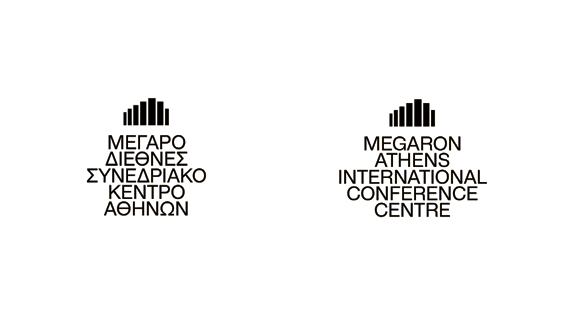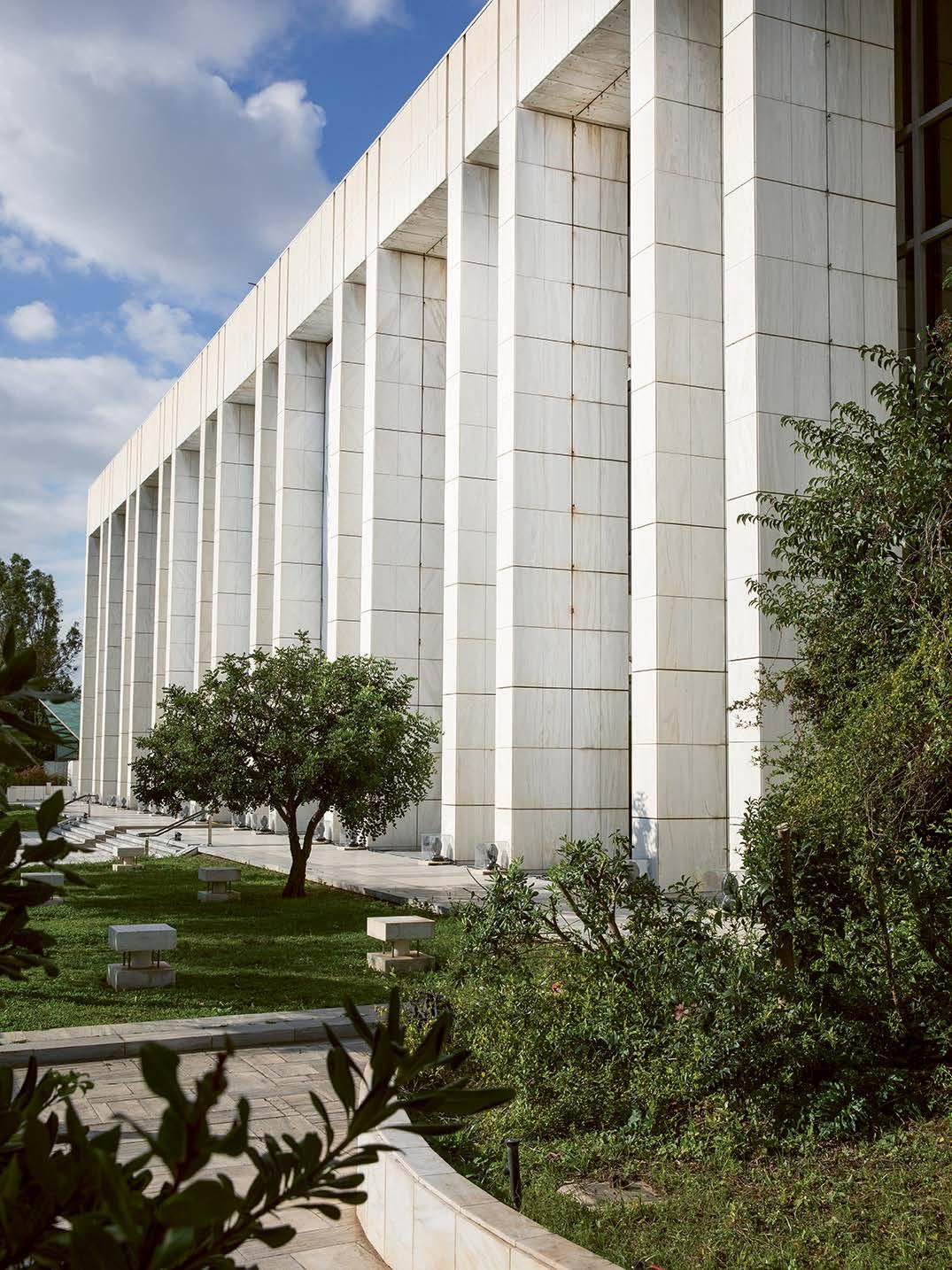BUSINESS EVENTS IN A NEW GEOPOLITICAL ERA
The issue of dysfunction versus stability

PRIORITISE DEI
DIFFERENTIATION IS ESSENTIAL PATHS TO PROGRESS THE BROADER IMPACT KELLERMAN















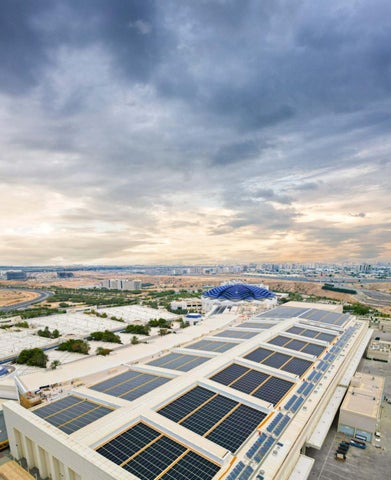
The issue of dysfunction versus stability

PRIORITISE DEI
DIFFERENTIATION IS ESSENTIAL PATHS TO PROGRESS THE BROADER IMPACT KELLERMAN





















We are proud to be the first hospitality company to launch Verified Net Zero hotels. Through third-party verification and alignment with the Net Zero Methodology for Hotels, we’re turning ambition into action.











































































This is what the future of hospitality looks like. Powered by 100% renewable energy, fuelled by low-carbon cuisine, and driven by minimum waste principles, our Verified Net Zero hotels are setting a new benchmark for sustainable stays.
















Discover the future of sustainable travel with our first openings in Manchester and Oslo.







MANCHESTER CITY CENTRE, A VERIFIED NET ZERO HOTEL





OSLO CITY CENTER, A VERIFIED NET ZERO HOTEL


































Professor Ondrej Viklicky, M.D., CSc. is an internationally renowned physician specialising mainly in kidney transplants, and also a recipient of the award for long-term contribution to the meetings industry at the Ambassador Awards Evening organised by the Prague Convention Bureau. International congresses and conferences are an integral part of his professional career, lasting almost 35 years.
“Congresses, conferences and small symposia are, apart from their postgraduate contributions, also a place for meetings and establishing contacts resulting in future cooperation, which is absolutely necessary. Above all, international events are essential for us as a smaller country in central Europe,” says Professor Viklicky. “We have the opportunity to present our findings and achievements, but we can also absorb new information and quickly implement it in clinical practice and research, which we excel at in the Czech Republic. This is true for all medical disciplines, but it is especially true for small disciplines such as transplantology and nephrology.”
medicine. “At IKEM, we have built a laboratory of the so-called molecular microscope offering clinical services not only for all transplant centres in the Czech and Slovak Republics, but also for patients in other countries,” explains Professor Viklicky.
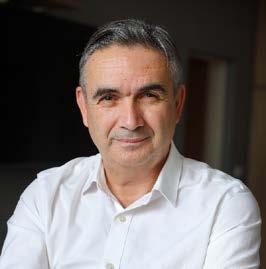
Professor Viklicky has organised countless events related to organ transplantation, nephrology or immunogenetics and transplantation pathology. In 2011, with Professor Böhmig from Vienna, he founded annual Czech-Austrian nephrology symposia, resulting, among other things, in the first European paired exchange of kidneys from living donors. He repeatedly attempted to organise the ESOT European Congress, eventually successfully: “The Czech Republic is one of the most active countries in organ transplantation, and transplantology is one of the most successful areas of our medicine. At IKEM alone, we perform more than 300 kidney transplants a year, allowing us to carry out many research projects and studies, many of which are the result of international cooperation. We are so pleased that, in two years, the ESOT Congress will be held in Prague again after 20 years.” Recently, he has also been trying to attract colleagues to Prague for symposia on molecular
Professor Viklicky passes on his many years of experience not only through professional events, but also through the education of young doctors. “Transplantology is attractive to young colleagues. Mainly because it combines several disciplines – internal medicine, surgery, immunology, microbiology, epidemiology, but also intensive medicine. At IKEM, we organise many different postgraduate activities for young doctors and make sure that they travel to international congresses, mainly with active participation. Since 2012, we have also been educating young transplantologists from all over the Czech Republic at the School of Transplantation Medicine programme, which is in great demand every year.” According to Professor Viklicky, personal meetings are of great benefit even in the age of digitisation. “In the online world, dialogue and non-verbal communication are disappearing. In my opinion, the importance of online platforms lies more in the meetings of smaller groups of experts who already know each other, or in remote seminars, with no need for demanding travel.”
For beginning doctors considering bringing in or organising an expert event, Professor Viklicky has some advice: “Probably the main thing is choosing a reliable partner who will help with the organisation. Organising an event in Prague is a pleasure: there is enough capacity for various events, with helpful professionals available. Being active in the preparation of the event and having the support of other colleagues, that is, professional societies with one’s own participation, are necessary.”
Transplantology is not Professor Viklicky’s only passion. He enthusiastically devotes his free time to oenology – the science of wine. He sees this hobby as a suitable accompanying “social event”: “I can imagine, for example, a walk in one of Prague’s vineyards in Troja with a glass of wine and an expert commentary.”



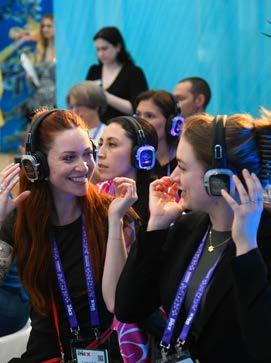
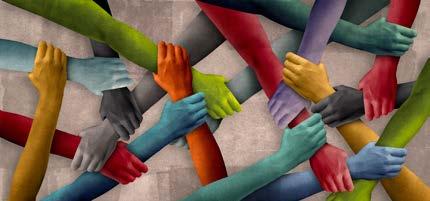
42 Shaping the Narrative of Business Events in Africa
9 Words Are Containers of Power INTRO Atti Soenarso reflects on the currently ongoing world-stage blitzkrieg on free speech, and its implications.
10 A Paradigm Shift LONG-TERM CONSEQUENCES When global knowledge and expertise are shifting away, in favour of wall-building exercises.
26 Can your Observations and Memories Be Trusted?
PS y CHOLOGICAL MEETINGS Hans Gordon ponders whether we can trust our memories of events, or even the perceptions that formed them.
32 Business Events
Are a Priority for Abu Dhabi STRATEGIC DE v ELOPMENT Benefits like knowledge exchange and sector development underline why business events are a priority for the emirate.
36 The Zambia Business Events Sector Is Headed for Significant Growth PATHS TO PROGRESS While putting ‘afronauts’ on the moon remains, Zambia has a rich mosaic of meeting facilities and supporting infrastructure ready.
THE BROADER IMPACT The strategic foresight of Rick Taylor’s unrelenting decades of pioneering work towards the infinite horizons of futures imagined.
50 Key Priority: Integrate DEI Into Every Aspect PRIORITISE DEI Embrace inclusivity to create more meaningful, diverse, and impactful experiences for all attendees.
54 Oman Continues Its Progress Towards Sustainability
SUSTAINABLE IMPACT In a testament to their efforts, Oman was recently named the least polluted country in the GCC.
64 How to Create Competitive Advantage and Set your Meetings and Events Apart CREATE AD v ANTAGE Scott Steinberg on clever and cost-effective strategies to help stand out, and stay one step ahead of the pack.
70 How Many Scientific Conventions Will the US Lose Under Trump? KELLERMAN Roger Kellerman on the consequences of driving knowledge and talent oversees, or just plainly into the sea.
LEGALL y RESPONSIBLE EDITOR IN CHIEF Atti Soenarso atti.soenarso@meetingsinternational.com
PUBLISHER Roger Kellerman roger.kellerman@meetingsinternational.com
GLOBAL SALES DIRECTOR Graham Jones graham.jones@meetingsinternational.com
TEXT Rob Cotter, Eugene Gerden, Hans Gordon, Gary Grimmer, Roger Kellerman, Atti Soenarso, Robin Sharma, Scott Steinberg, Mike Williams
PHOTOS / IMAGES Front cover: iStock.com/Antonistock, Sara Appelgren, Roger Kellerman, Magnus Malmberg, Keith Melvin-Phillips, Mark Strozier
DESIGN KellermanDesign.com
EDITORIAL RA y S OF SUNSHINE Democracy + Athens Agora + The staff at Hotel Grande Bretagne + Orestis Plakias + Food Pharmacy
SUBSCRIPTION Subscribe at www.meetingsinternational.com or subscription@meetingsinternational.com
CONTACT Meetings International Publishing Formgatan 30, SE-216 45 Limhamn, Sweden info@meetingsinternational.com www.meetingsinternational.com
PRINTING Exakta Print AB, Malmö 2025 [environmentally certified, ISO 14001]
PAPER Arctic Paper Munken Pure 100 g + 240 g FSC labeled paper Cert No SGS-COC-1693
ISSN 1651- 9663
Facebook @MeetingsIntCom
LinkedIn @Meetings International
Instagram @meetingsinternational


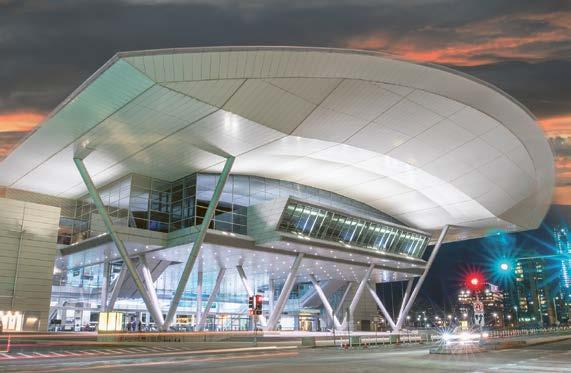
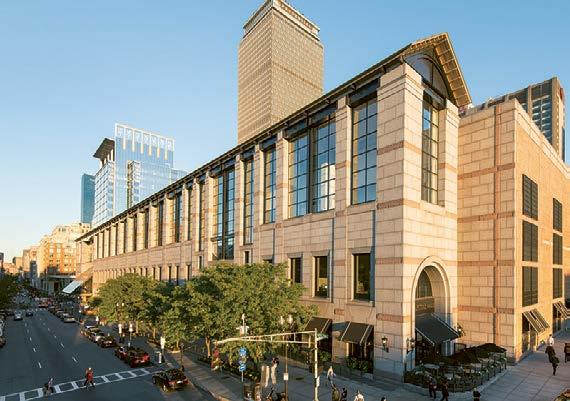
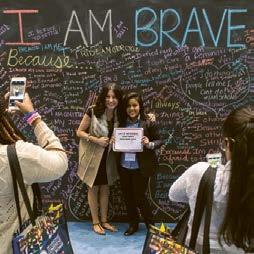


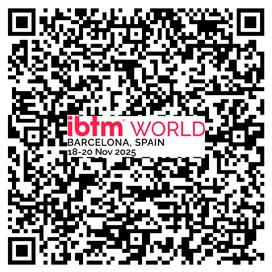
Authoritarian governments fear the transformative power of words that expose truths, challenge injustice, and inspire change. Since his return to the White House, the US president has been governed not just by executive orders, but also by imposing and forbidding specific vocabulary in what can be compared to a semantic lightning attack in the field of words.
A growing list of words and materials are being scrubbed from US government websites and documents in an attempt by the president’s administration to remove all references not only to diversity, equity and inclusion (DEI) but also to climate change, vaccines, and a many other topics. The effect of excluding those words will be so restrictive that, for example, researchers will shift, or leave, focus in their respective subject areas. Moreover, banning words deprives scientists of the ability to describe the world accurately.
Words make all the difference across multiple domains of human experience. From the neurological release of neurotransmitters during language processing to the psychological effects of framing, from the

persuasive power of marketing language to the metaphorical structuring of political thought, words fundamentally shape how we perceive, think about, and interact with reality.
Words trigger specific brain responses, activate emotional reactions, shape cognitive frameworks, facilitate or hinder social connections, and reinforce or challenge cultural values. The choice between similar words with subtle differences can produce dramatically different outcomes in communication, persuasion, decision-making, and relationship-building.
What happens when we use certain words and not others in our daily lives or in our work? Lists of undesirable terminology are being used to identify and block federal funding for research that does not align with the new administration’s values and remove information from government websites. According to a compilation by the free speech and civil rights organisation PEN America, over 250 words are on these lists.
PEN America is built on the belief that “words matter.” Its mission centres on the power of language and the right of all people to speak freely.
The organisation defends free expression in the US and globally, opposing any efforts to restrict language or discourage the use of certain words. PEN America views language as a tool for truth, dialogue, and social change and sees its defence of free expression as rooted in law, literature, and writers’ voices.
“How can we have intelligent or difficult conversations if we can’t even use the words, the most basic unit of meaning? We’re now living in a country where the government has decided that a sweeping array of everyday terms will be erased and forbidden in government agencies, websites, or even scientific research proposals,” says Jonathan Friedman, PhD, Sy Syms Managing Director of US Free Expression Programs at PEN America. He supervises research, advocacy, and education related to academic freedom, educational gag orders, book bans, and general free expression in schools, colleges, and universities.
Remember the proverb: Words are free; it’s how you use them that may cost you.
Swedish-Indonesian Atti Soenarso has worked as a journalist for over 40 years. She has worked for Scandinavia’s largest daily newspaper, was TV4’s first travel editor, has written for many Swedish travel magazines and has had several international clients. She has travelled the length and breadth of the world and written about destinations, people and meetings.


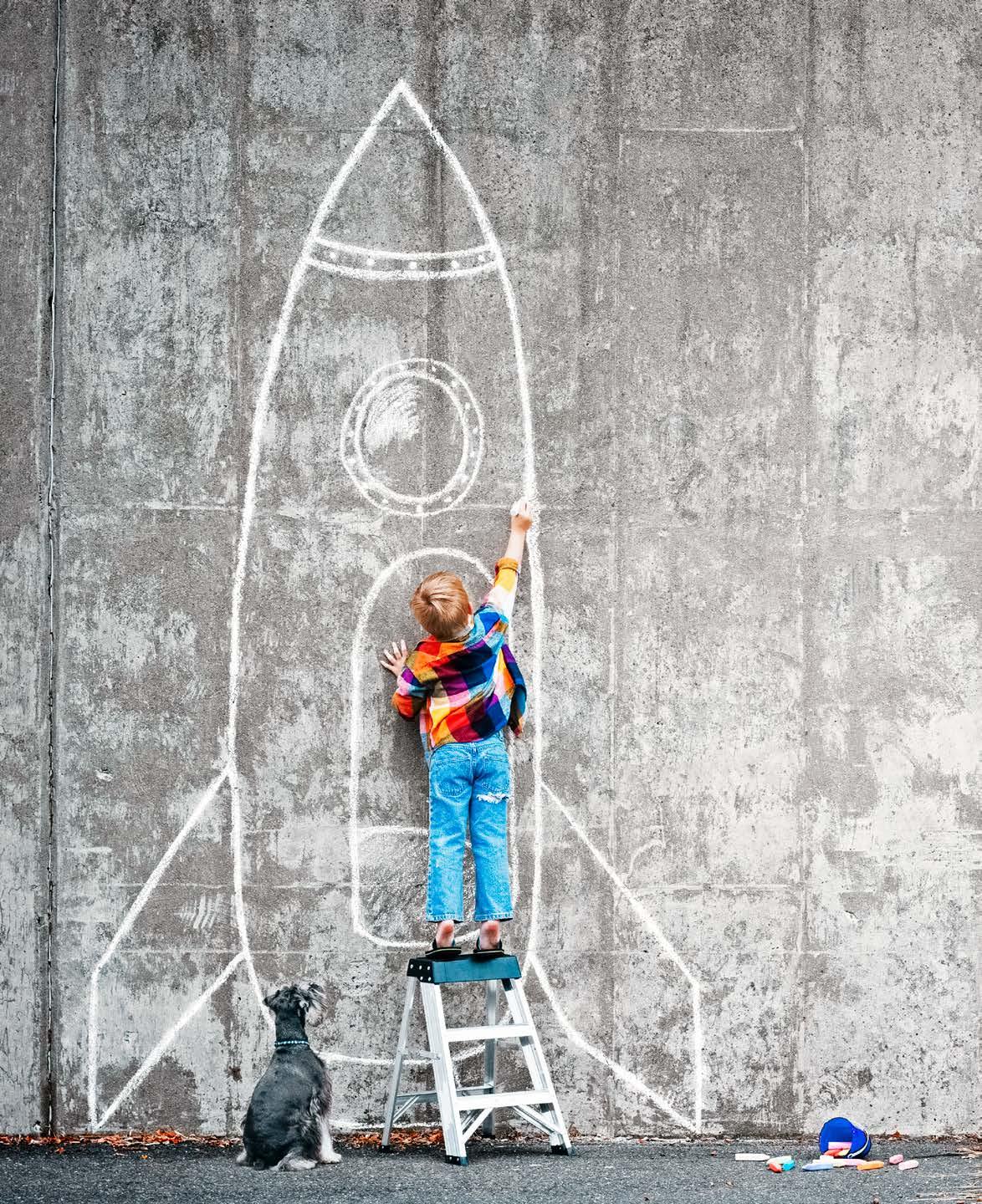
In his 1914 poem, Mending Wall , American poet Robert Frost offered some sage advice about barriers:
“Before I built a wall I’d ask to know What I was walling in or walling out, And to whom I was like to give offense. Something there is that doesn’t love a wall, That wants it down”*
In the first few months of the new United States Administration, the US has been in a frenzied wall-building mode, but not the wall Mexico supposedly would pay for eight years ago. When you think about it, everything happening there now is about erecting barriers, some physical and others in a more figurative sense.
There’s a revolution going on in America right now, perhaps best defined as national policy by culture war. Regarding economic and social upheaval, if Covid-19 was an earthquake, it would only be a precursor to the seismic disruption coming out of the US just now, which may have even longer-term consequences. Like in the early days of Covid-19, people in the association, corporate, and
meetings worlds are worried and trying to anticipate how the chaos will play out and what it means for their future planning.
First, let’s do a quick review of all of America’s types of wall-building and what the ramifications might be in a broad context. Then, we can explore how the world may change and the implications of that change for associations and meetings.
America is Building a Lot of Different Walls
Trade Barriers America’s trading partners have been whiplashed with on-again, off-again tariffs. The lack of coherence in America’s trade policies is reaping confusion, doubt,
“ No one is around to constrain a commander-in-chief whose perspective of the world is simply that of a real estate developer”
retaliation, and general concerns about both near and long-term economic effects.
Likely Impacts: A broad consensus has emerged, including forecasts by the International Monetary Fund (IMF ), that the world will likely experience lower growth. Fractured trade will likely result in supply chain disruptions, business dislocation, higher consumer costs and lower investor confidence. That has obvious ramifications for associations and meetings, and the sharp end of that stick is all financial.
Isolationist Fencing America is returning to historically familiar practices of disengagement, detachment and “lonerism.” The last two periods required world wars to pull America back from its self-imposed isolation. Both wars ended with the formation of global peace and security organisations, first the League of Nations and later the United Nations, for which US future support is in question. Having the US reduce its commitments to security arrangements like the UN and Nato could
potentially have far-reaching repercussions. US foreign policy is now clearly in the hands of neophytes, and their collective approach is naïve, transactional and unsophisticated. This time, no one is around to constrain a commander-in-chief whose perspective of the world is simply that of a real estate developer.
Likely Impacts: Europe’s most critical issue is Russia and the Ukraine. The US has neither the character nor the aptitude to help broker a resolution. The war is likely to be protracted. The outcome will probably be more favourable for Ukraine if the US can get enough minerals, or more agreeable for Russia if better real estate exists. While the populations of Gaza and Israel are demonstrating for peace, they are both politically dominated by unpopular and intransigent antagonists. It seems that the US can’t care less about Africa, as it cuts aid and watches idly as children die. of course, the biggest story is China and we’ll come to that later.
Border Walls Despite the lack of brick-and-mortar, border clearance




“There’s a revolution going on in America right now, perhaps best defined as national policy by culture war”
is a physical barrier. People have to get past the security personnel and through the turnstiles. There are lengthy delays in visa clearances. Newly-imposed entry restrictions are blocking travellers from certain countries. Tales of denied entry, lengthy interrogations, and even detention are creating an atmosphere of fear and uncertainty, adding to the effects of this barrier.
Likely Impacts: Canadian companies are restricting travel to America, while France and the UK have joined Canada in issuing travel advisories. Arrivals tracking shows that numbers from some European countries to the US are down 30 per cent. Travel polls suggest significant further reductions in trans-Atlantic travel. Research firm Tourism Economics has changed its forecast from an 8 8 per cent growth to a 9 4 per cent decline in international visitor arrivals to the US for 2025
Blocking Research and Science
Many of America’s leading scientific institutions are being effectively gutted. The National Institute for Health, Center for Disease Control,
National Science Foundation, National oceanic and Atmospheric Administration, the US Geological Survey, etcetera, are all losing experienced personnel, funding, and the autonomy to study or monitor issues that don’t align with the Administration’s priorities.
Likely Impacts: For health, there will be setbacks in early prevention, treatment, and pandemic preparedness. For science, there will be reduced discovery and innovation. The reduction in American institutional capacity will generally affect research, and lead to a reduced ability to address global challenges. America will likely experience a brain drain. It is already being reported that research scientists are seeking opportunities in places like Europe, Canada and Australia.
Confining Intellectual Freedom An administration of a political party that was always obsessed with reducing government incursions into people’s lives is now deciding what books people can read. Books that government censors perceive to be too
“ US foreign policy is now clearly in the hands of neophytes, and their collective approach is naïve, transactional and unsophisticated”
“woke” or to promote concepts like Diversity, Equity, and Inclusion (DEI) are being removed from bookshelves. Tellingly, at West Point, America’s military academy, books that address themes of race and racism are disappearing, while Mein Kampf is still on the shelves. other banned themes include books on gender issues, climate change, and potentially many different topics that do not align with current government philosophies.
Likely Impacts: Reduced exposure to diverse viewpoints, cultures and historical contexts. Negative impact on critical thinking and informed citizenship.
Restraining Academia Members of the conservative community see universities as promoters of leftist ideology. So, naturally, the US Government’s response is to purge any semblance of that ideology and supplant it with rightist ideology. Walling in rightist thinking and walling out leftist thinking is again an attempted form of control that is exercised by restricting government funding to universities that don’t comply with imposed guidelines. Recently, America’s richest university, Harvard, refused to comply and is now threatened with losing over €1 .78 billion
in research grants and cancelling its non-profit status.
Likely Impacts: Harvard is a good case study. Its alums, faculty and researchers have been awarded more Nobel Prizes than any other university in the world. So, if Harvard is diminished, there will be less research by PhD’s and fewer new discoveries. That effect would be multiplied across a nation with over 30 per cent of the world’s top 100 ranked universities.
Closing Gates on Civil Liberties and Due Process The Administration’s actions in deporting US legal residents to foreign prisons without due process, and its subsequent refusal to obey court orders to return them, is heightening fears of a constitutional crisis. Fundamental principles of the rule of law and America’s constitutional system are being sorely tested. In addition, in an assault on DEI, the government is pressuring companies with government funding or contracts to remove DEI from their operations and programmes.
Likely Impacts: If the US Administration’s efforts to subvert the courts’ authority were successful, there would be enormous scope for damage
to civil liberties, social order and stability.
If it’s America vs China, Don’t Underestimate China
It’s hard to argue with 1 .4 billion people living in the world’s secondbiggest economy. China’s prosperity is both an inspiration and a perceived challenge in various parts of the world, especially in the West. However, in many ways, it could be reasonably argued that America’s current policies threaten Western stability, values, and interests more than China’s. Plus, an economic downturn in China would have negative effects across the entire globe.
China is at the centre of another of the American government’s current wall-building exercises. This wall is called the containment policy.
So, the US is now waging an unprecedented trade war with China. Anyone who thinks China is going to lose this trade war doesn’t have a scintilla of understanding of China’s recent history, economic strength, dexterity, politics, and culture. Unfortunately for all of us, that would include everyone in the inner circle at the White House overseeing foreign and trade policy.
It’s hard to imagine that China, the world’s largest creditor nation,
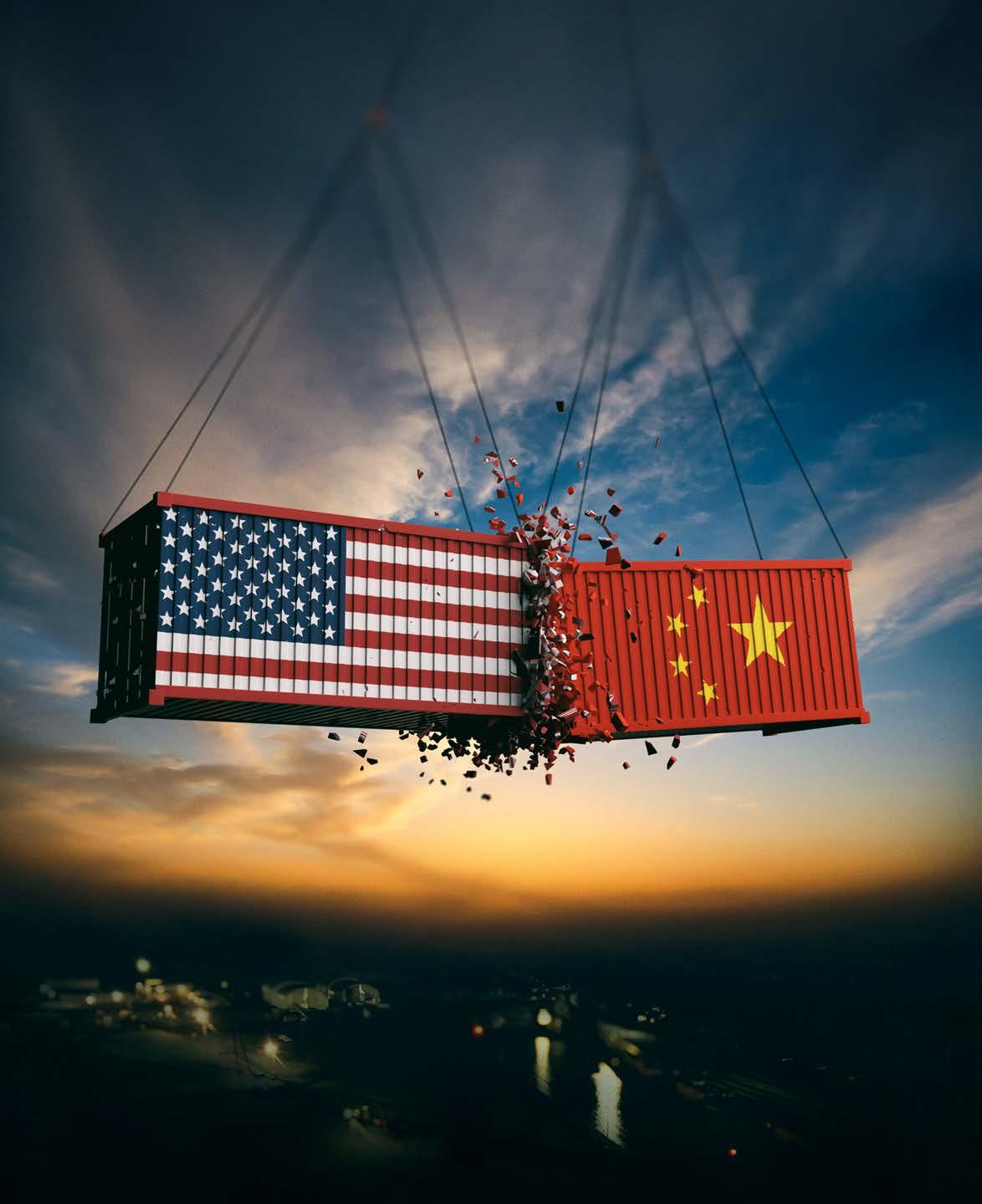

“Associations will avoid destinations, like the US, that demonstrate prejudicial border clearance treatment of people from the Muslim world or other countries”
will lose a trade war with the US, the world’s largest debtor nation. Already, China has a commanding position in global trade, and Bloomberg’s modelling shows that, as constituted today, the tariffs will only add to the lead; pushing many more countries to work more with China and less with America.
In a guest essay for the New York Times, Moira Weigel, an assistant professor at Harvard, wrote that in China, one of the many nicknames for the President of the US is “Chuan Jianguo”, which translates as “Trump the nation builder.” The inherent joke is that the nation is being built in China.
It’s telling that China graduates more doctors, scientists, and engineers each year than America and Europe combined. Twenty-five years ago, eight out of ten countries conducted more trade with the United States than with China. Today, seven out of ten have China as their largest trade partner.
Here are a few additional facts about what’s happening in China from an article by David Wallace Wells, writing in the Economist:
China is now routinely installing as much solar power as the rest of the world combined while producing
90 per cent of the world’s solar panels and more than three-quarters of its electric batteries.
China controls over 90 per cent of the world’s supply of rare-earth metals, essential ingredients in things like smartphones, semiconductors, computer screens and the magnets that power our electric vehicles.
on an annual basis, China surpasses the US in new patents and spending on university and government research.
China is the second largest developer of new drugs, and between 2013 –2023 , its share of global clinical trials grew from four per cent to 28 per cent.
China produces more scientific papers than Europe or the US and is doing 60 per cent of cuttingedge research in materials science, engineering, chemistry, and computer science.
Forecasting is risky business. of course, anyone can guess the future, and they will eventually either be proven right or wrong. The running joke is therefore that all probabilities are 50 per cent – either something will happen or it won’t.
A way to improve “future thinking” is scenario forecasting. That involves making predictions based on which of various possible scenarios will occur. The trick is identifying likely tipping points or triggers that tell you a given scenario is about to happen. The following scenarios will largely determine whether the dysfunction continues, or if America and the world gradually return to stability.
Here are future scenarios that will have a dramatic impact on the issue of dysfunction versus stability:
Scenario 1: Judicial intervention US lower courts are willing to restrain or at least slow the Administration’s actions, though the Supreme Court has prevaricated. Lower courts will likely continue to slow things, but ultimately, stability will require meaningful intervention by the high court. A cautionary note here is that judicial efforts to constrain the Administration would require enforcement, which the courts have no power to effect. And the Republican-controlled Congress is actively avoiding confrontation with the White House. However, barring a full-grown constitutional crisis, the
Supreme Court begins to push back, or the Administration will be relatively free to do as it pleases.
Scenario 2: Congressional control
The midterm elections in November of 2026 will greatly affect the question of stability or extended dysfunction. History shows a likelihood that at least one of the houses of Congress will shift to the Democrats after the mid-terms. Given unfavourable poll
conclude a new trade agreement. That is essential to the economic health of both countries and the world economy. However, Trump effectively lost in that case because he aimed far higher than a reasonable new trade relationship. His will be a hollow “victory,” given all the chaos resulting from confrontation rather than negotiation. And the negative reverberations of the exercise will take time to percolate out of the
“ The assault on scientific institutions will mean fewer science-related conventions coming to the US ”
results for the Administration, the Democrats may regain control of both houses. Continued Republican control of both houses means more of the same for the ensuing two years. A divided Congress means the Administration’s goals will be stymied. A Democratic Congress would likely mean that the legislative branch would shift the balance of power back to Congress and the courts, and effectively begin an active march back to stability.
Scenario 3: Trump loses the trade war with China and declares victory I chose that wording because of the high likelihood that this is what is going to happen. As discussed, there is no reason to believe China will lose the trade war. There is reason to believe that China and the US will, sooner rather than later, actually
world’s economic system. So, the answer here is likely to be stability but over time, with lingering economic health complications over the next few years.
Scenario 4: The White House responds to market turmoil Though the Administration has, so far, shown a cavalier attitude toward the adverse market effects of its policies, the bravado could end as conditions worsen and approval ratings keep falling even lower. Then again, the current occupant of the White House has shown limitless reserves of bravado in the past and, some might argue, has no real grip on reality. Again, the dysfunction will compound if the Administration persists in its current direction. And even if it does go into course correction, benefits may take a long time to materialise.
What all of this means is that the damage has already been done. The question will be how much the damage is exacerbated and then, ultimately, how long it lasts.
What are the implications for associations and meetings?
Indeed, any broad global impacts arising from US wall building will impact associations and meetings in the US and all other parts of the world. Here are some of the likely challenges that associations and business event planners will face for the foreseeable future:
Associations losing members In a weakened economy, individuals and companies will cut costs in various ways, including reduced investment in association membership.
Lower attendance numbers In the US, government employees are being restricted from participating in meetings. Numerous factors point to reduced participation levels both in the US and globally. Rising costs deter people in normal times, and that effect is heightened in a worsening economy. In addition, people whose travel to meetings is corporate sponsored will lose travel authorisation from their employers.
Reduced meeting revenues
Uncertain trade policy will drive uncertainty in supply chains and distribution channels, leading to higher prices and a softening consumer market. That affects profits, which means tighter budgets, lower sponsorship levels, and fewer exhibitors.
Higher meeting costs It would be practical for associations and meeting planners to assume that there will be higher staging costs for meetings.


Tariffs and rising costs, in the US and globally, will likely increase logistics, material and services costs. It will translate into higher meeting costs and, ultimately, higher costs for the delegates who attend.
Fewer and smaller meetings US Government agencies are being directed to cancel meetings, which will have
clearance treatment of people from the Muslim world or other countries where they have members. America’s border enforcement practices about foreign arrivals have always been problematic. But the welcome sign for many people has now been totally removed.
Regarding international meetings, if you are an association leader, meet-
“ China is now routinely installing as much solar power as the rest of the world combined”
a measurable effect there. Economic factors, including lower attendance, higher costs, and reduced revenues, will likely result in a downward trend in the size and number of meetings.
International meetings are shifting away from the US The assault on scientific institutions will mean fewer science-related conventions coming to the US.
BTN Europe reports that up to twenty per cent of travel buyers are considering cancelling, moving, or not attending meetings and events in the US, while ten per cent are considering cancelling employees’ attendance at US-based events.
Then there’s the issue of border clearance A helpful analogy is that many associations have avoided holding meetings in countries that have visa bans on Israeli citizens in the past. Naturally, associations will also avoid destinations, like the US, that demonstrate prejudicial border
ing planner or destination promoter from outside the US, your prospects could be a bit brighter in one way. Many Americans remain eager to collaborate. Canada and Mexico are still neutral, welcoming places for associations seeking partnerships and engagement in North America. other countries will also likely benefit from the relocation of international meetings that won’t now be going to America.
*The poem “Mending Wall” is set in rural New England, where Robert Frost lived at the time, and takes its impetus from the rhythms and rituals of life there. The poem describes how the speaker and a neighbour meet to rebuild a stone wall between their properties, and a ritual is repeated every spring. This ritual raises essential questions throughout the poem as the speaker considers the purpose of borders between people and the value of human work.
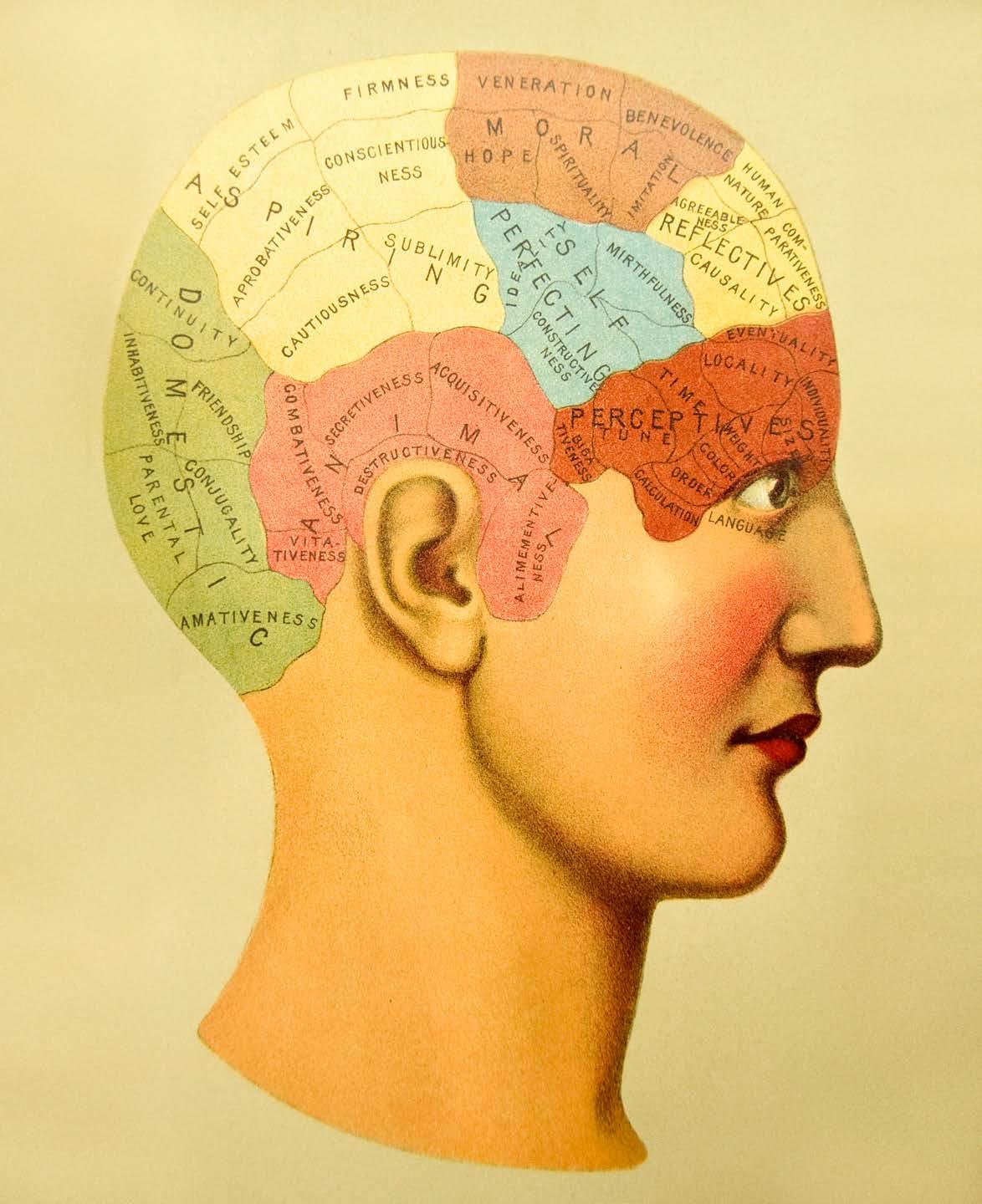

PHOTO Sara Appelgren
Hans Gordon, PhD, Associate Professor, Authorised Psychologist, specialised in Aviation Psychology. Authorised psychotherapist, since 1987 running Gordon Consulting. Has for decades been engaged by airline companies, among them SAS and Thai Airways International.
Memories don’t just fade, as the old saying would have us believe; they also grow. What fades is the initial perception, the actual experience of the events. But every time we recall an event, we must reconstruct the memory, and with each recollection, the memory may be changed – coloured by succeeding events, other people’s recollections or suggestions, increased understanding, or a new context.
Truth and reality, when seen through the filter of our memories, are not objective facts but subjective, interpretative realities. We interpret the past, correcting ourselves, adding bits and pieces, deleting uncomplimentary or disturbing recollections, sweeping, dusting, tidying things up. Thus, our representation of the past takes on a living, shifting reality, a living thing that changes shape, expands, shrinks, and expands again, an amoebalike creature with powers to make us laugh, and cry, and clench our fists. Enormous powers – powers even to make us believe in something that never happened.”
Excerpt from the book Witness for the Defence by Dr Elizabeth Loftus
“The next turn leads us to a small town we have never visited before,” he said to his wife, sitting in the passenger seat beside him. “Let’s turn in there to have a look.”
The wife did not reply but nodded her approval.
“Look, how nice this looks,” he said. “With the whole view of the lake. I suggest we park somewhere, take a short walk and see if there’s a lovely café where we can have a coffee.”
memories of these experiences. Experiences are mainly based on our internal representations of what we register through our five senses: sight, hearing, smell, taste, and touch. Sometimes, a sixth sense is added, called proprioception, which can be translated as the sense of balance and body perception.
Do we hear everything that goes on in what we call reality? The answer is no, absolutely not. Young people
“ One of the great mysteries of scientific psychology is how humans experience our lives and store memories of these experiences”
After he pulled into a car park and they both got out of the car, the wife said they had visited the town a few years ago. She recognised herself very well.
“No, no, no,” the husband said emphatically. “We’ve never been here. At least I haven’t.”
“You have,” the wife retorted. “We’ve both been here.”
The couple’s discussion was intense but brief. The husband said that the wife had made a mistake, and the wife claimed that the husband had apparently lost his memory. They made peace by remaining silent without giving in to the other. It had to be what each of them thought. In any case, the difference did not affect the flavour of the coffee and its accompaniments. Both declared themselves satisfied, after which the car journey continued.
one of the great mysteries of scientific psychology is how humans experience our lives and store
can perceive sounds in the full range of human hearing, between 20 Hz and 20,000 Hz (vibrations per second). It is a limited range. The equivalent hearing of dogs is between 40 Hz and 60,000 Hz. Many animals can hear even higher and/or lower sounds than this. In addition, human hearing deteriorates over the years, usually affecting high frequencies and gradually spreading to lower frequencies. For example, most people over 30 cannot perceive sounds above 18 ,000 Hz. Thus, the calls and songs of crickets and small birds are gradually silenced.
It is the same with our other senses. The modern metropolitan man, who mainly lives and works in our engineered technological environments, is quickly becoming increasingly depleted in his ability to correctly read all the natural, surrounding information about everything constantly happening. Even the flavour of our dishes cannot
be enjoyed the same way as when we were younger. What we feel we are experiencing may no longer exist as it is. As compensation, we often activate our memories and relate to them when describing what we see, hear, smell and taste.
Is it then possible to trust our memories? Are they imprinted in an unchanging fact box in our brains? No, they are not. our brains are plastic, much like soft, changeable, and living organisms beyond our control. An adult human brain consists of about 65 billion nerve cells (neurons) and almost as many protective layers (myelin) around the nerve cells. Each neuron has specific projections (dendrites) that receive signals and other projections (axons) that transmit signals. Signalling to and from neurons occurs around the clock, even when we sleep. It is done via synapses, which are the conducting contacts between dendrites and axons. The number of synapses in the still-young but biologically mature individual is almost infinite.
When we talk about our observations of the world around us, and of ourselves, being stored in the brain, we are referring to the fact that the conflicting streams of biochemical and electrical signals in different parts of the brain are activated over and over again, forming repetitive traces, which can, however, be gradually or suddenly affected and changed, by diseases, physical injuries, agerelated degeneration, but also by additional, new, intense experiences. Thus, what you remember today may be adjusted and changed tomorrow. Moreover, some brain traces are easily affected, while others remain in more stubborn, persistent patterns. Those easily influenced are usually summarised as constrictions, much as if the brain steers clear of what seems less important to occupy itself with.

you ready to organise your next business event with a lasting impact?
Sustainability is at the heart of everything we do at Rotterdam Ahoy Convention Centre. As the award-winning 'Location of the Year 2024' in the Netherlands, known for constant innovation, we o er a unique combination of scale and impact. With 35 breakout rooms and plenary spaces, we are perfectly equipped to host conferences for 1,200 up to 7,000 guests.
Located in Europe’s best-connected large city Rotterdam, where innovation meets sustainability. Ahoy is 100% gas-free and built with the latest energy-e cient technologies. From solar panels and circular building materials to advanced climate control and sustainable catering, every detail has been considered. We actively support green mobility, reduce waste, and reuse water. A key initiative is the Urban Water Bu er, launching in 2025, which will collect and reuse 30 million litres of rainwater annually in the surrounding area.
A venue for business events that drive change, for a better future.
Learn more at ahoy.nl/sustainability
“Some brain traces are easily affected, while others remain in more stubborn, persistent patterns”
What is perceived as more frightening and traumatising, the brain often closes the door to, something referred to as repression. our brains are also constantly exposed to intense communication exchanges with the environment, often without us being aware of them. one example is the hormones that everyone continually secretes through their skin, known as pheromones. Each person spreads their special odour. Scents, or rather odours, are registered by others via the sense of smell (the olfactory system) through millions of receptors within each of us. When the mother smilingly says to the child, ‘I love you’ while unconsciously releasing 780 different pheromones expressing a blissful mixture of something else, that the child’s receptors are reading at lightning speed – what happens inside the child? What takes place in the child’s brain? Probably lightning-fast bioelectrical trails that suddenly collide with each other and mainly cause confusion, whereupon the child tries to escape by closing in on itself and distancing itself from its surroundings. other, to us unconscious, communication systems in our social life can be even more complex and
complicated. An almost gigantic field of research belongs to the so-called chaos theory and touches many academic disciplines, such as ecology, economics, physics, mathematics, medicine, meteorology, psychology and others. The so-called butterfly effect was described and coined in the late 1970 s by the American mathematician and meteorologist Edvard Lorenz, who described how the butterfly’s wings in some remote place on our planet could affect air currents in ways that eventually open up for a hurricane far away somewhere else. Among other things, this has opened up interest in physics’ endeavour to understand the microcosm via quantum physics, where most of it is about energy waves that sometimes take the form of particles and sometimes continue only as waves. Light and its photons are illustrative examples of this.
Is it conceivable that an individual’s active brain activity can also orchestrate wave motion outside the body and that other individuals’ neurons can pick up these activities with their dendrites in the brain? Theoretically, it could be possible. If so, we could communicate via language, pheromone exchanges, and other energy systems that are
entirely unconscious. The latter could be divided into either harmonising or non-harmonising parts. The harmonising parts would then be the building blocks for potentially good, productive ‘brain forces,’ memory banks included, while the non-harmonising ones would lead to misunderstandings, misconceptions and generally more destructive processes.
The man embraces the woman softly and intimately, whispering “I love you.” At the same time, a burst of energy-filled waves shoots out from the man’s brain and is picked up by the woman’s neurons. Unable to make sense of the concurring messages, she reacts by pulling away slightly, wearing a frown.
Could things really be working this way? I turn to an expert in the field of chaos theory, and a theoretical physicist at that, Professor Ulf Danielsson*. In some of his recent writing, the following caught my eye: “With most of what exists, we still don’t know what it is.”
*Professor Ulf Danielsson is a member of the Royal Society of Science in Uppsala/Sweden, and the Royal Swedish Academy of Sciences. He was previously vice-rector of Uppsala University.
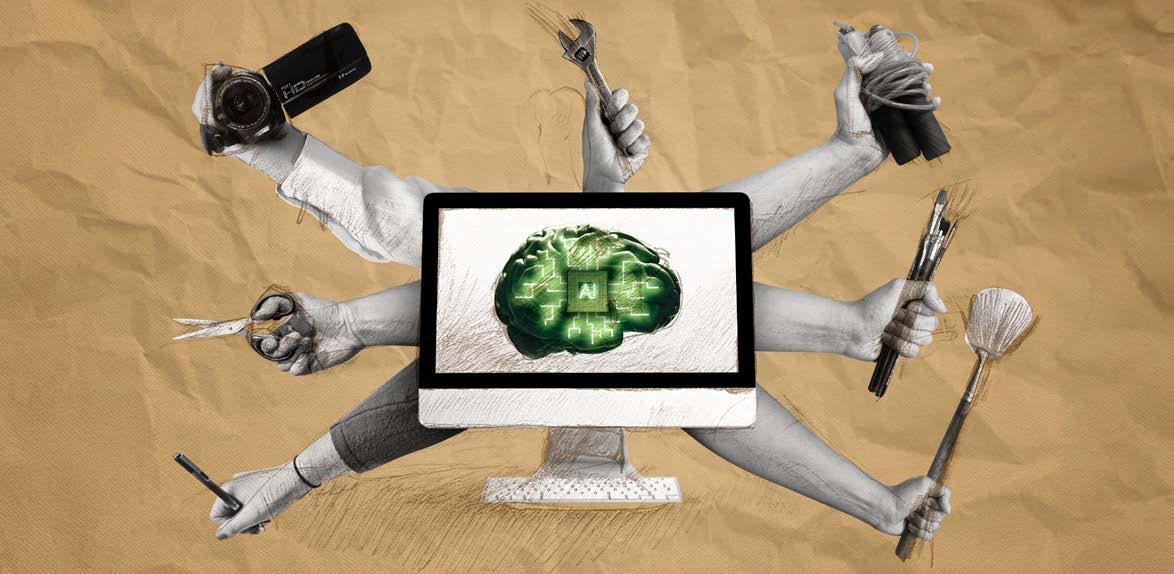
AI reduces stress for employees when they have to complete many tasks. The same stress reduction applies to employees with new tasks. The result is according to a new study by Örebro University in Sweden and The Ratio Institute, an interdisciplinary research institute with a research focus on the conditions of business and enterprise.
“There is a perception that AI leads to increased demands and faster work pace, which can increase stress. Here, we find the opposite, at least for one group of employees,” says Magnus Lodefalk, an Associate Professor and researcher in national economics at Örebro University.
The study is based on a representative sample of workers in Germany, which included workers of different genders, ages, and occupations. Magnus Lodefalk and his Danish colleague, Michael Koch, an Associate
Professor at Aarhus University, found that employees more exposed to AI are less likely to report increased stress levels. AI, as a job aid, can reduce stress.
“The link between reduced stress is found in employees who perform new tasks at work, and if they perform many tasks. The stress reduction may be due to AI automating certain tasks. AI can also help employees perform other tasks faster and better,” says Magnus Lodefalk.
He cannot pinpoint a direct reason for why AI can reduce stress in new tasks: “Previous research suggests that the technology can automate some tasks and give rise to new, more complex tasks. Perhaps this makes work more meaningful and stimulating.”
Can the study’s results provide practical guidance? The results align with the general advice to learn about
and adopt technology where appropriate, but the study was conducted before the big breakthrough with generative AI, such as ChatGPT
“It is possible that the results hold up, as generative AI can be a tool that makes work more stimulating and simpler tasks can be automated. Presumably, the type of job plays a role in how you are affected. If you have a less complex and more monotonous job, there may be a risk of increased rather than decreased stress, as some previous research suggests,” says Magnus Lodefalk.
“The next step in research in this area is that we hope to repeat and deepen the study once they have more up-to-date data where generative AI has had an impact.”
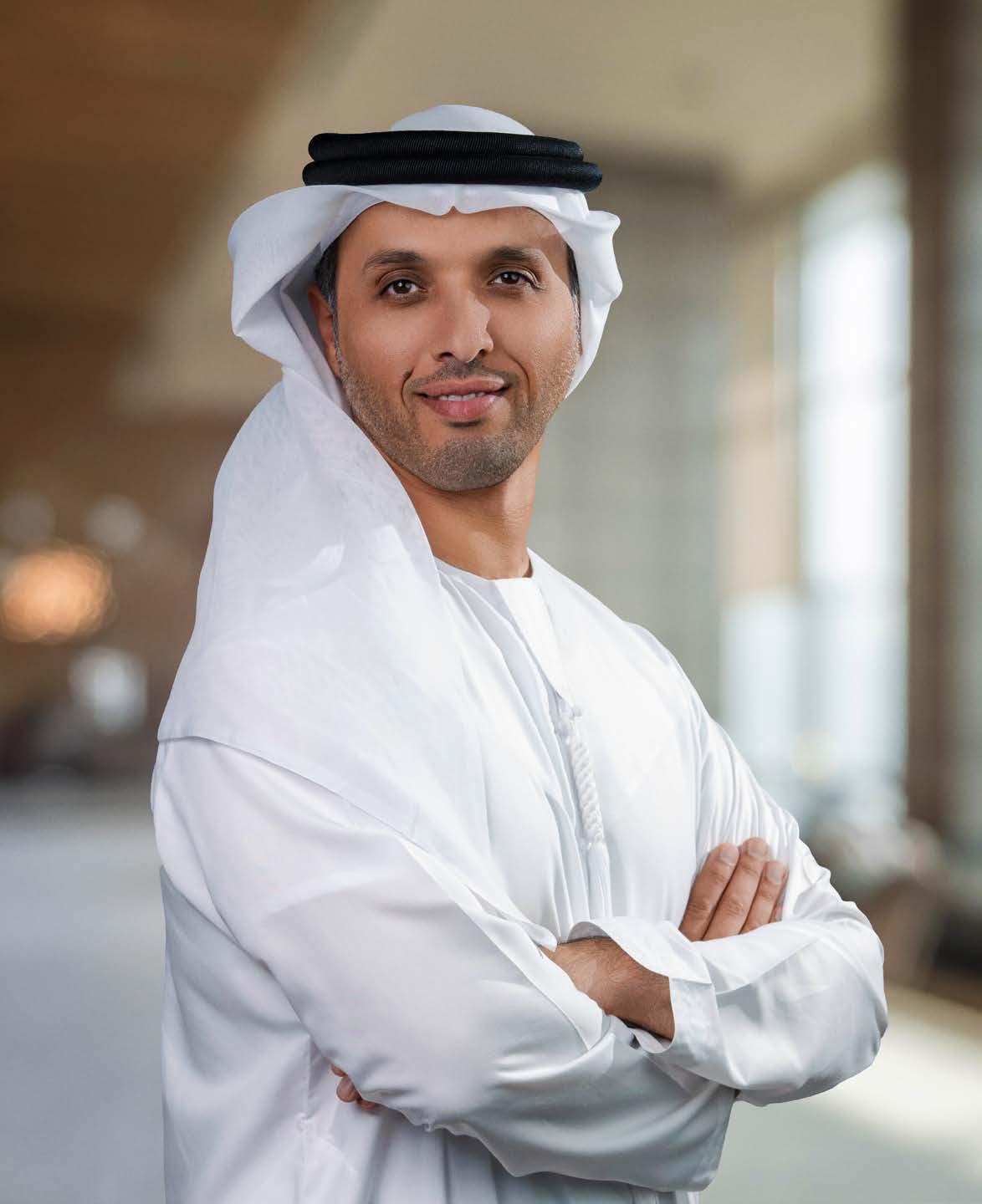
Business events are crucial in promoting Abu Dhabi’s economic priorities and aligning with the emirate’s strategic plans. This is reflected in the Abu Dhabi Economic Vision 2030 and other financial strategies, which work closely with the focus areas to identify and attract suitable events, conventions, conferences, trade fairs, and exhibitions.
Tourism is a key sector within this framework, and the Department of Culture and Tourism in the emirate is actively collaborating with leading tourism organisations such as the United Nations World Tourism organisation (UNWTO) and the World Travel & Tourism Council (WTTC) to drive initiatives for the development of the sector. In line with these efforts, Abu Dhabi will host major B2 B business events, including the IAAPA Expo Middle East
(31 March–2 April 2026) and Skift Global Forum East 2025, among other business events. These events are part of a broader strategy to position Abu Dhabi as a global hub for business events, reinforcing its economic growth and international connections.
“Business events play a key role in fuelling the growth of our economy and create a crucial knowledge exchange in key sectors. Trade fairs and exhibitions act as drivers of trade and commerce, while business events, conventions, and conferences facilitate knowledge exchange and contribute to the long-term impact and legacy of the city,” says Mubarak Al Shamsi, Director of Abu Dhabi Convention & Exhibition Bureau.
In March 2019, the UAE hosted the Special Olympics World Games in Abu Dhabi, the first-ever World Games
held in the Middle East and North Africa. Building on the legacy of the Games, the UAE announced its commitment to implement the Special olympics Unified Champion Schools (UCS) programme in all public schools in the country. In 2020, Sheikh Mohamed bin Zayed Al Nahyan committed €22 million on behalf of the UAE to expand the UCS programme to six countries – Argentina, Egypt, India, Pakistan, Romania and Rwanda.
sovereign wealth funds, including the Abu Dhabi Investment Authority and Mubadala, which manage over €1 .51 trillion in assets together. Abu Dhabi’s economic growth, fuelled by a knowledge-driven economy, AA credit rating, and a favourable tax environment, creates diverse business opportunities,” says Mubarak Al Shamsi.
“Secondly, the strategic geographical location provides unrivalled connectivity. Abu Dhabi is within six hours flying time of two-thirds of the
“ Abu Dhabi is characterised by its commitment to innovation”
In addition, business events attract human capital from researchers, academics, and professionals who contribute to progress in various sectors. They also encourage foreign direct investment and help build active sectoral communities crucial for sustainable development and growth. Moreover, business events strengthen Abu Dhabi’s global influence for economic and intellectual benefits by positioning the city as a leading industry player. Besides, they contribute significantly to the tourism sector by improving hotel occupancy rates and increasing revenues for attractions, retail, and food and beverage, strengthening the emirate’s economic ecosystem.
“Three key factors shape our positioning as a global hub for business events. Firstly, economic strength makes Abu Dhabi an attractive destination for business and investment. The emirate is home to some of the world’s largest
world’s population and serves as a central meeting point for global business events.
“Thirdly, Abu Dhabi is characterised by its commitment to innovation and supports a thriving entrepreneurial ecosystem with 12 startup accelerators and incubators, access to funding and robust R&D support. The emirate’s global technology hub, Hub71 , has nurtured 318 startups that have collectively raised over €1 .4 billion, demonstrating our ability to scale innovative business ideas globally.”
Abu Dhabi’s leadership recognises the vast potential of business events and their impact on different sectors. The benefits, from trade and investment to knowledge exchange and sector development, underline why business events are a priority for the emirate. During the Covid-19 pandemic, the emirate strengthened its commitment to the industry through its stimulus fund, accelerating
initiatives under Ghadan 21 , a government programme to drive economic diversification. Much of this funding involved organising business events, underlining their strategic importance in the emirate’s broader economic and development plans.
“Sustainability is also a key focus for us at the convention bureau, and several initiatives have been implemented to support environmentally responsible business events. We have introduced Sustainability Guidelines for Events, developed in consultation with stakeholders, to ensure that business events follow sustainable practices,” says Mubarak Al Shamsi.
An example of this commitment was the 63rd ICCA Congress 2024, the first global event to achieve the Zero Food Waste to Landfill Event Standard, certified by The Pledge on Food Waste. Abu Dhabi’s strategic location further contributes to sustainability efforts, as its proximity to two-thirds of the world’s population within a six-hour flight significantly reduces carbon emissions associated with long-distance travel.
“We also recognise the importance of ensuring that our events are zero net carbon emitters, and we are actively reviewing and implementing strategies to offset the carbon emissions generated by our business events. Launching the Carbon Calculator for hotels and our partnership with Ne’ma to reduce food waste at events are just a few more ways we follow sustainability principles. These initiatives reflect Abu Dhabi’s broader vision of a sustainable and responsible hospitality ecosystem.”
Ninety-three hotels in the emirate have received their WTTC Sustainability Basics verification, meeting criteria that include energy and water conservation, green cleaning products and community benefits. Some hotels awarded the certification
“The emirate’s business events sector is prepared for significant growth”
include Le Royal Méridien, Marriott Hotel Al Forsan and Fairmont Bab Al Bahr.
“We are proud of the hotels’ continued efforts to improve their sustainability practices and contribute to a greener future, in line with Abu Dhabi’s vision of a hospitality ecosystem that follows industry best practices.”
The emirate’s business events sector is prepared for significant growth, but several key areas require attention to drive the global business events industry forward. Human capital development is crucial, as investing in local talent will support innovation and ensure the industry’s long-term success.
Abu Dhabi is developing the next generation of business events professionals to lead the industry forward. Another key focus is consumption and resource management, with a strong emphasis on environmental responsibility. To support sustainable growth, destinations, organisations, and suppliers must work together to reduce events’ eco-friendly footprint. Technological developments are reshaping the events industry, offering increased efficiency, creativity, and sustainability.
“Many event solutions can change how we plan and execute events, bringing the best benefits to our customers and creating mutual value. By embracing technology, we can stay ahead of the curve, streamline operations and deliver superior experiences for attendees.
“Business events are a key pillar of the Abu Dhabi Tourism 2030 Strategy, and several strategic initiatives are in place to ensure long-term growth. The focus remains on maintaining a world-class infrastructure, developing a skilled and well-trained business events workforce, and incorporating sustainable practices to ensure responsible growth. Moreover, technology, including AI-driven solutions, increases the sector’s efficiency and enhances delegates’ experiences. These strategic initiatives reinforce Abu Dhabi’s ambition to establish itself as one of the world’s premier destinations for business meetings and conventions,” says Mubarak Al Shamsi.
“We face challenges related to human capital development, sustainable growth and technology integration. Besides, negative perceptions of security in the region persist. Still, Numbeo has ranked Abu Dhabi as the
safest city in the world in 2025 , the ninth consecutive year it has topped the list since 2017, reflecting the emirate’s efforts to develop pioneering security plans, strategies and initiatives. We are founded by the Abu Dhabi government, which ensures sustainable investment in business events as a key driver of economic and social development.”
In the next five to ten years, business events will continue to play a central role in the emirate’s economy, supporting trade, investment, and development.
“The government is committed to continuing to invest in the industry and ensuring that Abu Dhabi consolidates its position as one of the world’s premier destinations for global business events.”
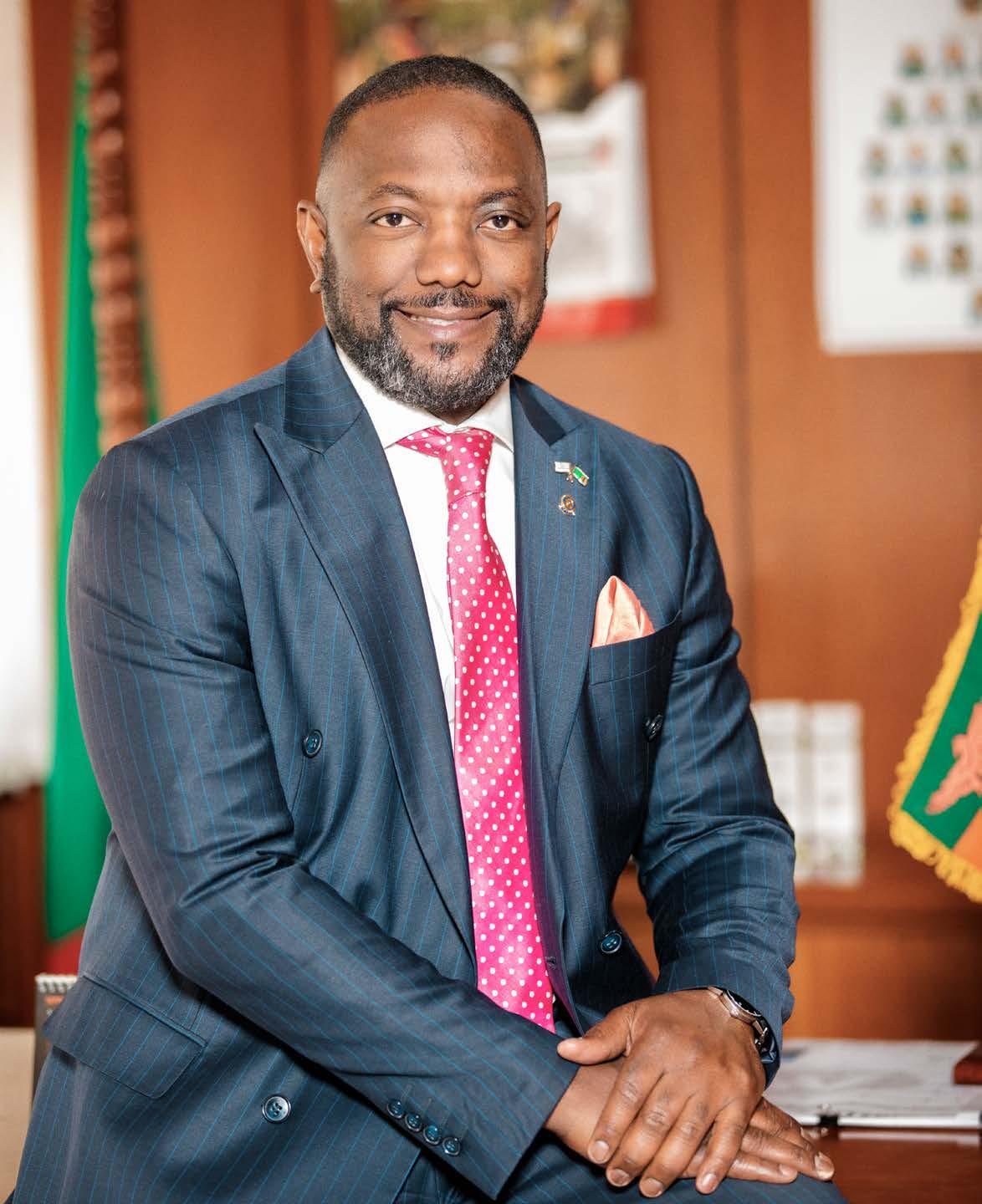
TEXT
Rob Cotter
During the 1960 s, the world was gripped with coverage of the battle between the Cold War adversaries, the Soviet Union and the United States, to control the final frontier: space. In what became known as the ‘space race’, this culminated in the 1969 mission of Neil Armstrong and Buzz Aldrin to reach, and ultimately set foot on, the moon.
Most people weren’t aware, however, that at the same time, a third country had also quite surprisingly entered the fray with its space programme: Zambia. Appointing himself as the director of Zambia’s unofficial National Academy of Science, Space Research and Philosophy, the stated goals of Edward Makuka Nkoloso were not just to join the race but to be the first to land his cadets, or ‘afronauts’, as he called them, on the moon.
While Edward Makuka Nkoloso’s overtures to several countries for funding for his programme came to nought and were viewed as a more comical than serious pursuit, in their own way, they did act as a sign of selfconfidence for a country that had only just gained its independence from British rule in 1964 . More than anything else, they suggested that there might be no limits to the ambitions of the newly arisen nation.
Fast-forward more than half a century, and on a continent broadly still playing catch-up with the rest of the world, this sense of ambition is now permeating the country’s nascent business event industry. The destination possesses a rich mosaic of meeting facilities and supporting infrastructure, particularly in its capital, Lusaka. The Mulungushi International Conference Centre
and Kenneth Kaunda International Conference Centre are stand-out venues, as well as those in the top tourist draw of Livingstone near Mosi-oaTunya (Victoria Falls). Today’s vision for growth around these facilities is being driven by the harnessing of the latent potential of the industry to political support from the centre that is essential to deliver it.
“This politician was once an operator in business events, and in
the economic prowess of hosting. As minister responsible for tourism and its subsectors, my primary interest will be how I increase the number of arrivals, how I increase the length of stay, and what needs to be done to make tourism a top contributor to the national GDP
“The tourism development agenda is also guided by the Zambia Tourism Master Plan, a 20 -year strategy launched in 2018 . However,
“ In five years, I foresee our destination will be where Africa meets”
we are now working on stakeholder engagement as part of destination preparedness. This is our ‘green field’ from where we build our hosting masses. You will be interested to know that our main teaching hospital attracts significant numbers of students and faculty all year round, and we are now very keen to see how we can begin including these numbers.
my past life, I complained to him about the inertia in government,” says Rodney Sikumba, Zambian Minister of Tourism. “When I crossed over, I better understood the processes that effect change in the public sector. Now, I am always preaching to others to trust the process. It may be slow, but once in motion, government progress can be unstoppable, in a good way.”
The government wants to attach this momentum of progress to an industry that it sees significant potential for in the immediate future and over the mid-to-longer-term horizons.
“our overall business events sector is built on a strong hosting history that dates back over six decades and is headed for significant growth in the next two years,” says Minister Rodney Sikumba. “We have built a reputation as gracious hosts and a beacon of peace sustained over the decades. We are now ready to harness
the pandemic revealed the size of our business event economy. over the past year, we have been preparing to develop a specific guiding document for this subsector. The silver lining of the pandemic was its revelation of the size of the business tourism industry, not only in our country but across the African continent.”
Recognising not just this scale but also the dimensions and complexity of the business event sector, Zambia is focusing more on developing its association base and beginning to enlist the country’s key sectors that can help properly enrich the industry.
“The associations movement in Zambia is emerging and in its formative years, and if I were to pick the most visible, the legal fraternity, medical practitioners, accountants, engineers, and unions would top my list. Having never commercially viewed associations, academia, and corporations as key components of our attractiveness as a destination,
“Zambia is a traditional host and enjoys rotational meetings that come to us based on our historical ties or membership to regional bodies. Further, our country has many regional and international bodies that continually host conversations at different levels. As the Zambian government, we have a deliberate policy encouraging government ministries and agencies to actively pursue hosting opportunities. The work we are putting in now will undoubtedly yield results in the next three years.”
In tandem with tackling this widened scope of the business event industry’s remit to extract its full potential, the government understands that it must simultaneously tackle some of the more pressing global issues for any industry today, none more so than that of sustainability, which the country is acutely aware of.
“We are at the tail end of what will soon be referred to as the worst drought our country has faced in the last three decades, where sectors such as agriculture were crippled, and our riverbeds dried up. But the resilience of tourism shone brighter than ever, and we now find ourselves in conversations that require us to rethink how we will ensure that we embed knowledge transfer about attracting and hosting events with sustainability at their core. In 2024 , we hosted the first Global EverGreening Alliance meeting in Africa. We utilised most
“Our position as a country linked by land and water to nine neighbours gives us a competitive advantage of cross-border travel as a business events host”
of our outdoors for the conference, showcasing the attractive hosting attributes in our destination.”
Tapping the destination’s USPs to help reduce event footprints will be central to the sustainability drive. At the same time, another strand of the meetings industry that has been garnering increasing interest in recent years and where a visible footprint is a desired outcome is that of a lasting legacy. Again, those promoting the Zambian business events industry have already tuned into this area.
“Personally, I am very intentional about the things I invest public resources into, and I do hope posterity will remember me kindly so I will respond to this with a practical example. Last year, we attracted the 67th Meeting of the United Nations Tourism Regional Commission for Africa, held in Livingstone. on the last day, the UN Secretary-General broke ground at what will become the first-ever UN Tourism Academy.”
With the path to progress and growth seemingly solidly laid for what is hoped will be a bright future for the business event industry, several clear challenges remain for Zambia to overcome, to ensure the country’s industry development doesn’t become derailed by blockages along the way.
“Before my political appointment, I operated a business events company based in Livingstone, our tourist capital. The number one challenge was connectivity; number two, limited hosting capacity; and number three, the lack of a skilled workforce specific to business events. These challenges hold today, so I am dedicating much effort to increasing our hosting capacity through infrastructure development, skills development, and advocacy for increased carriers in Destination Zambia.
“In five years, we will have built the required infrastructure to support our ambitions. We have several significant projects underway to increase our hosting capacity and ease access to our various natural attractions, with more to offer. We expect to see more in numbers.”
Currently undertaking projects aimed at better developing accessibility, safety, infrastructure and cultural and natural assets as part of the Green Resilient and Transformational Tourism Development Project aligned with the Zambia Tourism Master Plan, which has been backed by €89 million from the World Bank. The sights clearly set on boosting visitor numbers to business events have led to initiatives to increase visibility in neighbouring markets on the
continent and new source markets further afield that have previously been less aware of, or less exposed to, what the country can offer business event delegates.
“our position as a country linked by land and water to nine neighbours gives us a competitive advantage of cross-border travel as a business events host, and we are already actively hosting and promoting ourselves for all hosting opportunities within our borders. We have also embarked on increasing eyeballs on the destination through a global digital campaign on various online platforms. The main objective isn’t to convert this to instant visitors, but to increase the number of people that know we exist and what makes us special.”
Bringing a heightened awareness of the country as an event destination to a global audience neatly binds the spirit of ambition of the once spacedreaming ‘afronauts’ to the modernday country’s evolving meetings industry.
“I firmly believe that Zambia is the world’s best-kept secret. Everyone who visits leaves with a sense of belonging. In five years, I foresee our destination will be where Africa meets.”


“Regrettably, our world remains troubled and divided with conflicts that breed hatred and suffering. As a novelist, my sincere hope is that through the sharing of positive stories, however small their impact might be, that they would contribute in the human heart, connecting human hearts, one with the other, and that this in turn, may contribute, if even in a modest way, to move the world towards peace.”
Japanese author Haruki Murakami has been named Cultural Personality of the Year for the 2025 Sheikh Zayed Book Award, highlighting his massive literary impact on Arab culture.
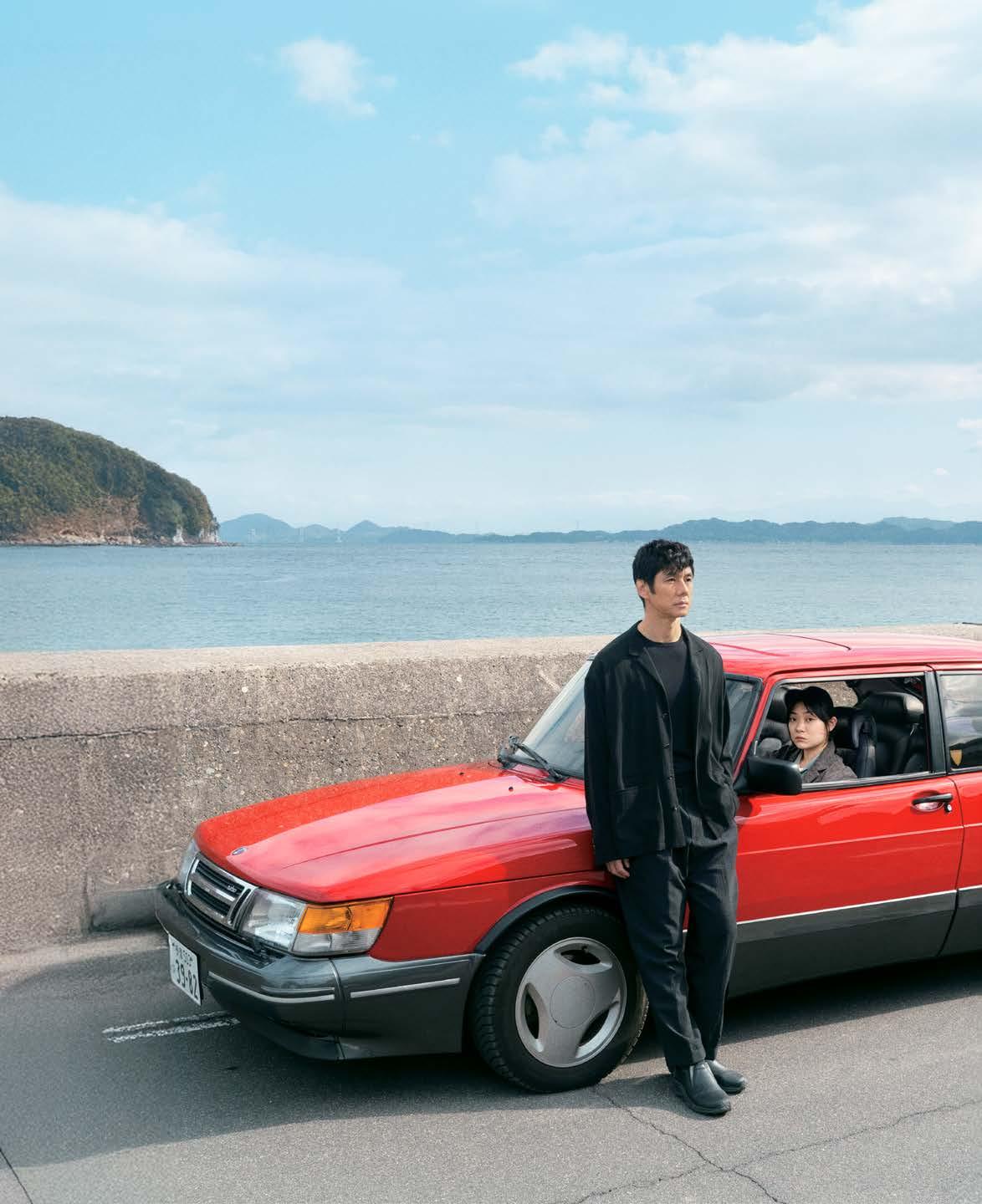
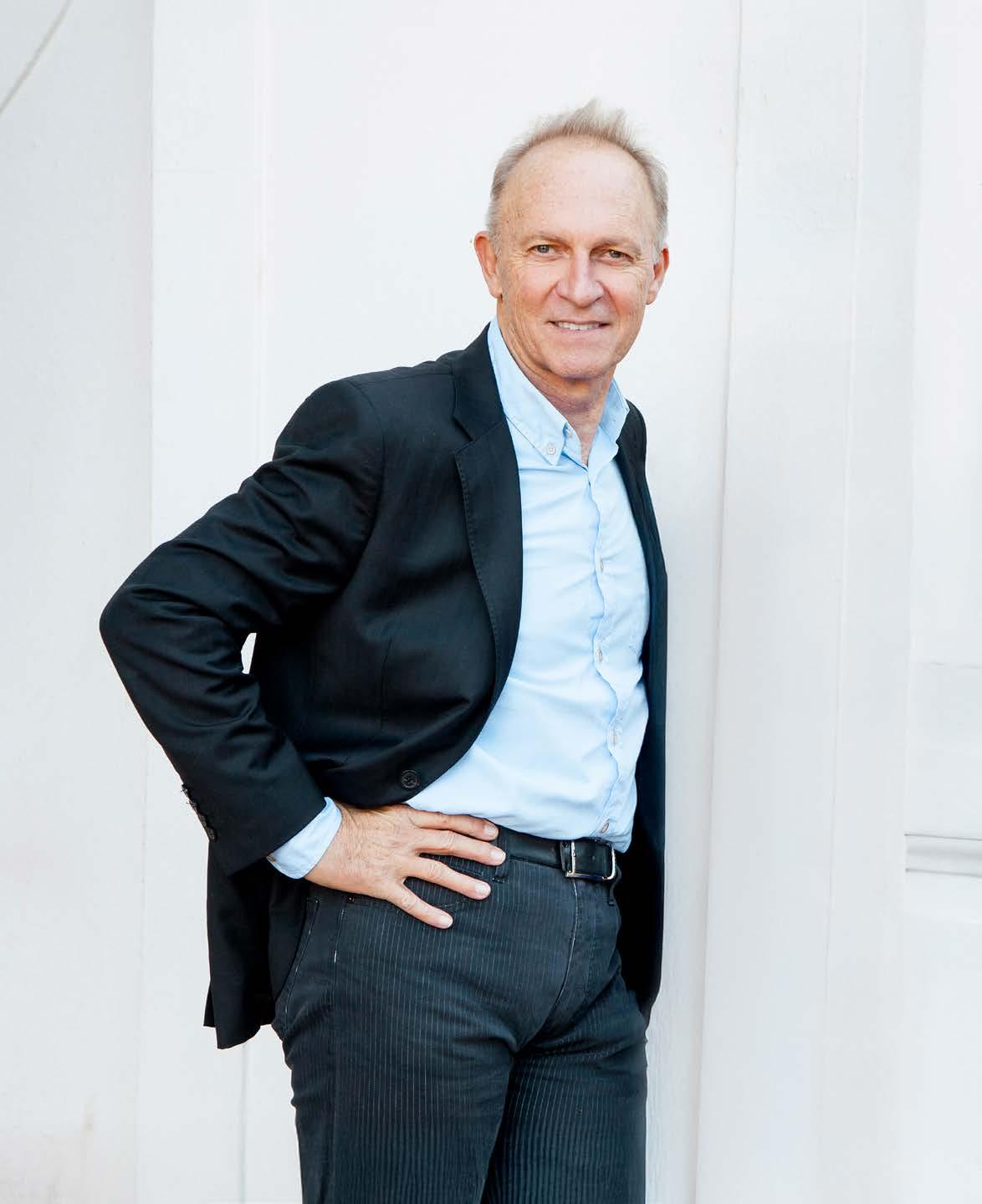
TEXT
Atti Soenarso
Few names resonate as firmly in business events as that of Rick Taylor, who has played a pivotal role in shaping Africa’s business events industry. With a career that spans decades, his contributions have left a permanent mark on the industry, shaping the narrative of business events as powerful catalysts for economic growth and development across the continent. As the driving force behind The Business Tourism Company, his visionary approach has transformed the perception and potential of meetings, incentives, conferences, and exhibitions across the continent.
After an early career in advertising as managing director of several agencies in Johannesburg, South Africa, his move to Cape Town in the 1990 s was the catalyst in his journey, taking an essential turn into tourism. Acquiring and marketing the Hout Bay Manor Hotel led to his appointment as the first CEO of Cape Metropolitan Tourism. This role created a pioneering tourism ‘Secret Season’ strategy to turn Cape Town and the Western Cape into an all-yearround destination through business events. This vision culminated in the establishment of the Cape Town
Convention Bureau and Cape Town International Convention Centre.
“The mission was to land comprehension in both public and private sector of the socioeconomic impact potential of business events within a tourism destination,” says Rick Taylor. His strategic foresight ensured Cape Town’s ascension as a global business events destination, hosting the 2004 International Congress and Convention Association (ICCA ) Annual Congress for the first time in Africa, marking a milestone achievement.
Among Rick Taylor’s achievements is his transformative work in Rwanda. Scepticism abounded when The Business Tourism Company was contracted in 2013 to establish the Rwanda Convention Bureau (RCB). Rwanda, often still associated with its troubled past, was not recognised as a business events destination. However, Rick Taylor saw beyond the scepticism and laid the groundwork for one of Africa’s most compelling business events success stories.
Rwanda Convention Bureau was more than a strategic win; it catalysed national transformation. In under a decade, Kigali rose from 21 st to second place in Africa’s ICCA rankings,
trailing only Cape Town. Rick Taylor’s role extended beyond strategy as he is particularly passionate about capacity building and mentoring local talent, empowering them to deliver the sector’s full potential. Frank Murangwa, the convention bureau’s first appointment, has since become a key figure in the global business events sector, recently appointed Director of ICCA Africa.
Rick Taylor’s recent endeavours in Uganda exemplify his ability to galvanise diverse stakeholders. Tasked with professionalising the Uganda Convention Bureau and establishing a strong business events sector in Uganda, his approach was to educate stakeholders about the potential legacy impacts of business events for socioeconomic transformation in local communities. The convention bureau is collaborating with stakeholders on a proactive bidding agenda to attract meetings to the recently opened international-standard convention centre at Speke Resort and other market-ready venues in Kampala.
“once the leadership understands the theory of business events, it’s all systems go. Uganda’s public and private sector are aligned with the
vision for business events articulated in the national meetings, incentives, conventions and events strategy.”
Expanding horizons across Africa
Rick Taylor’s work reveals a commitment to long-term impact. In Kenya, his efforts laid the foundation of a convention bureau, although political changes temporarily stalled progress. Similarly, projects in Ethiopia and Tanzania highlighted these nations’
seeds that will yield returns over time.
“With a strong national strategy for meetings, incentives, conferences, and exhibitions already in place, Mozambique will soon establish its Convention Bureau. There will be hiccups, undoubtedly, but the vision is in place.”
Throughout his career, Rick Taylor has championed that business events are far more than a niche sector; they
“ Success is not measured merely in rankings or revenues. It is calculated in the lives changed, the opportunities created, and the futures imagined”
potential, even as leadership shifts have created temporary hurdles. His contributions helped position Senegal as a rising star in West Africa’s business events sector. Its dynamic culture and developing infrastructure signal a bright future, though Rick Taylor is quick to caution that success requires patience, sustained effort, and a programme to upskill professional stakeholders.
“When you think about building a business events destination, you have to look at an infinite horizon; what impact will business events have on the city or country 50 years in the future? How have we in the public and private sector harnessed its potential?”
Mozambique’s political and economic landscape is currently somewhat complex, but Rick Taylor remains optimistic about its potential, likening the process to planting
drive economic and social development. His work consistently underscores the role of convention bureaux as conduits connecting government, industry, and local communities. By fostering ecosystems that support job creation, skills development, and investment, he has demonstrated that business event activities can catalyse broader societal benefits. Educational reform is a particular area where his impact is evident. In Rwanda and Uganda, universities incorporate business events-focused curricula, recognising the sector’s growing importance. This ripple effect illustrates the multifaceted value of Rick Taylor’s work.
one of Rick Taylor’s superpowers is his ability to tailor strategies to the special needs of each destination. His supermarket analogy encapsulates this approach, where each country offers a distinct ‘product’ to attract
global buyers. By leveraging a destination’s built-in strengths, he ensures that his strategies are effective and sustainable.
As Africa’s business events sector evolves, Rick Taylor foresees a shift in the balance of power. He predicts cities like Kigali in Rwanda could challenge Cape Town for the top ICCA rankings within the next five years, driven by their ambitious and innovative approaches. However, he cautions that maintaining momentum requires constant innovation and collaboration.
“Cape Town has its beauty and assets, but if it doesn’t keep at it, Rwanda’s hunger and ambition could see Kigali take over.”
Through his company, Rick Taylor has elevated Africa’s standing in the global business events industry while demonstrating the sector’s potential to drive transformative change. By unlocking opportunities across the continent, he has set a benchmark for what can be achieved with vision, perseverance, and an unwavering commitment to excellence. As Africa’s business events narrative unfolds, Rick Taylor’s contributions are a reminder that success is not measured merely in rankings or revenues. It is calculated in the lives changed, the opportunities created, and the futures imagined.
The Business Tourism Company is an Africanbased international tourism consultancy that has been active throughout Africa for two decades. Led by Rick Taylor, the consultancy specialises in destination development, management and marketing strategies in approximately 30 destinations in Africa, Europe, Australia, the Middle East, Asia and the Caribbean.
www.thebusinesstourismcompany.co.za
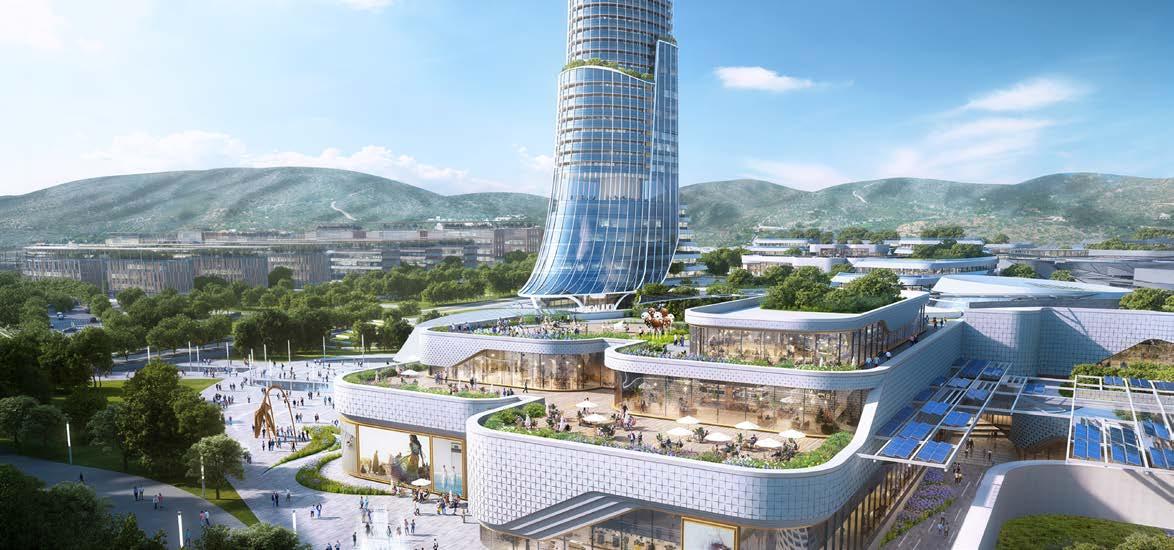
One of Europe’s most significant urban regeneration projects, the Ellinikon, is underway in Athens, just eleven kilometres from the city centre. The landmark plan by the Saronic Gulf coastline will be a gamechanger for Athens, its greater Attica region, and Greece.
The privately founded transformative development is located on the historic grounds of the former Ellinikon International Airport and aims to set a new standard for sustainable urban development. It is also a multi-dimensional project that combines acclaimed Greek and international architectural firms. It will revitalise the Athenian Riviera and establish Athens as a key player in the global network of urban centres.
Rooted in the principles of a “15 -minute city,” the €8 billion Smart City master plan is spearheaded by Lamda Development. The transformation will revive the obsolete site
of the international airport, which operated from 1938 until 2001 . The Marina was developed earlier to host the Sailing Centre for the Athens 2004 Summer Olympics. The old terminal building, designed by the Finnish-American architect Eero Saarinen in the 1960 s, will be adaptively reused as the centrepiece of a grand event space.
As Athens moves forward, the project is committed to redefining the urban landscape with a forwardthinking community, innovation, sustainability and culture. The vision is to revitalise the site into a dynamic hub, integrating cutting-edge technology with modern living and green spaces at the biggest coastal park in Europe.
For example, the Ellinikon will combine 10,000 upmarket beachfront residential spaces, one of Southern Europe’s largest shopping malls, a business park, hotels,
a state-of-the-art sports complex, entertainment and cultural centres, and the 200 -metre Riviera Tower to be Greece’s tallest building; all centred around a sprawling two millionsquare-metre park.
Additionally, the development will feature a 3 .5 -kilometre coastal front and a one-kilometre-long beach, in addition to 50 kilometres of walkways and bike lanes. Emphasis on electric transportation aligns with the project’s overall ethos of creating a cleaner and sustainable environment.
Visitors can already visit the Ellinikon Experience Centre and discover the redevelopment project through immersive technological exhibits and digital activities. The discovery is divided into five thematic zones that help demonstrate the project’s plans: Living a New Era, Living in Nature, Living the Future, Living Smart, and Living by the Sea.
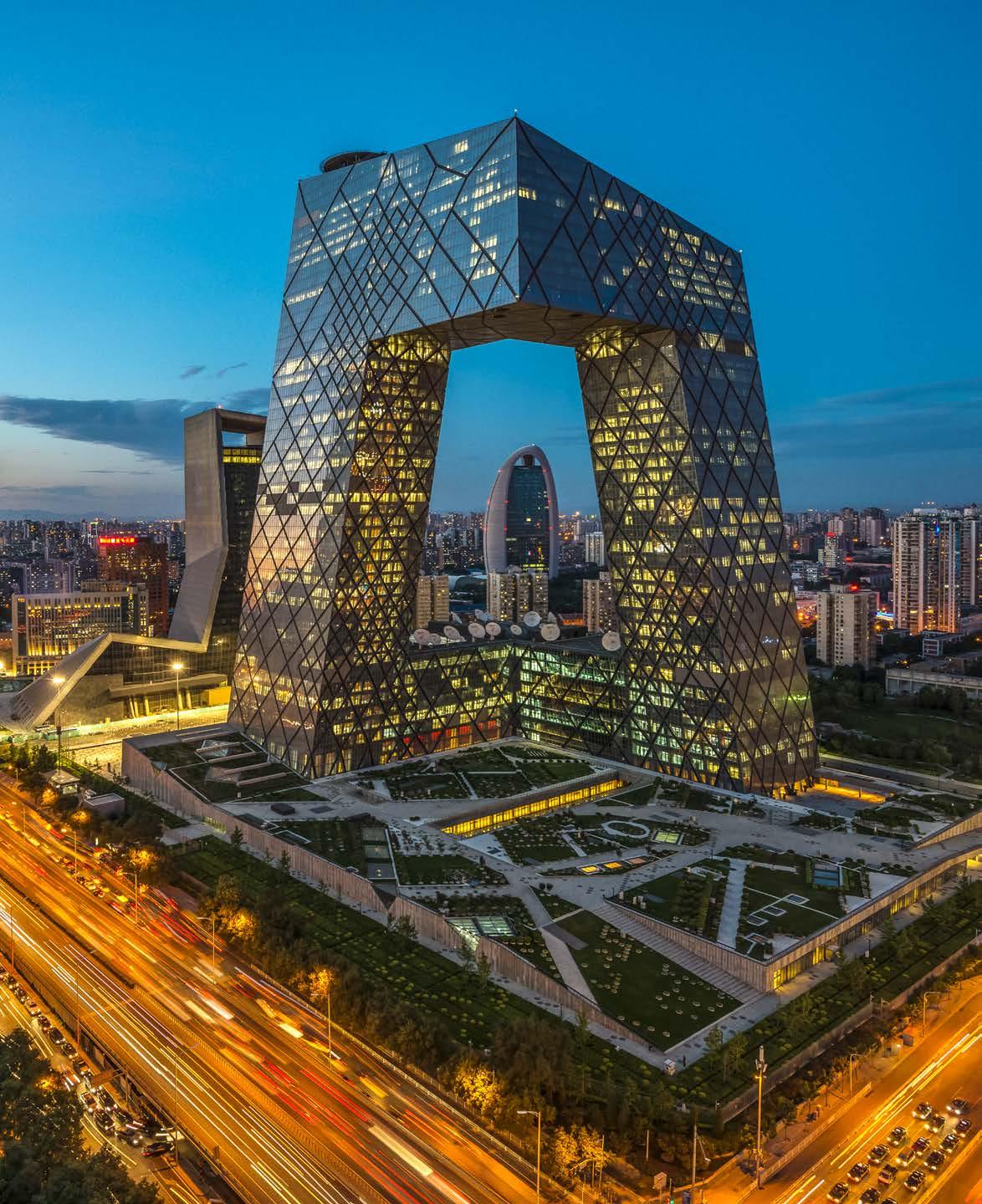
TEXT Eugene Gerden
The Chinese meetings and exhibitions industry is steadily growing despite concerns about a possible slowdown in the Chinese economy caused by trade wars with the United States and persisting geopolitical uncertainty.
In recent years, China has achieved serious success in attracting foreign businesses to its meetings and events sectors, and work in this direction continues. According to newly announced plans by the Chinese government and the Communist Party, the country’s GDP should grow by five per cent this year. This will be achieved by supporting and stimulating most sectors of Chinese economics, including business events. Since 2023 , the business events industry in China has completely recovered from the pandemic and demonstrated significant growth in 2024 .
The development of China’s meetings and exhibition industry started during the 1950 s, when the first China Export Commodities Fair (Canton Fair), held in Guangzhou in 1957, marked the beginning of the country’s modern exhibition and meetings industry. The industry experienced rapid growth during the 1990 s after the conduction of economic reforms in the country and its integration into global economics.
Before 2004 , government departments, associations, chambers of commerce, and state-owned exhibition companies held most of the industry’s events. The government had strict control over exhibitions and meetings, and strict approval was required to implement them. After 2004 , the government liberalised its policy in the domestic business events sector, and its development
is currently a priority, as reflected in The 14th Five-Year Plan for Business Development approved in 2021 . According to China’s Council for the Promotion of International Trade, the country is considered one of the world’s largest meetings and exhibition destinations. As part of the plans of major industry players and
larger than in Europe. Today, the major Chinese exhibitions include the China International Import Expo, China International Chain Expo, China International Fair for Trade in Services, and the Canton Fair.
The construction of the new industry’s infrastructure currently exceeds the exhibition demand. From
“ China is currently experiencing the internationalisation of major exhibitions and meetings”
the local government, China is to create conditions for further strengthening its status in years to come.
As stated in the latest China Exhibition and Meetings Economy Development Report 2024, which was prepared by China’s Council for the Promotion of International Trade, in 2024 , a total of 3 ,844 economic and trade exhibitions, meetings and events were carried out, with a total area of 155 million square metres. The number of exhibitions and meetings is the same as in 2023 , but the exhibition area has increased by 10.1 per cent year-on-year. The average exhibition and meeting space grew from 35 ,900 square metres in 2023 to 40,300 square metres in 2024 , representing an increase of 12 3 per cent.
Chen Xianjin, President of the Shanghai Exhibition Industry Association, claims that China’s professional exhibition and meetings facilities area ranks first globally, reaching 16 .26 million square metres. It is nearly double that of the second-ranked United States and
2020 to 2023 , the supply of new exhibition and meeting space nationwide increased by more than four million square metres.
Wu Shengrong, Director of the Exhibition and Meetings Management Department for the China Council for the Promotion of International Trade, fears this may create serious problems for the industry in the middle term. If the demand for exhibitions does not increase but the supply of exhibition centres does, the imbalance between supply and demand will be severe.
Shanghai New International Expo Center is one of the largest Chinese-German joint venture exhibition centres. Its general manager, Michael Kruppe, notes that China is one of the most promising meeting and exhibitions markets, attracting many international exhibitions and meeting companies to establish their presence in the local market.
In parallel, the Chinese government plans to provide additional support to the industry this year through subsidies. A significant part
of the planned subsidies is expected for domestic companies to ensure their more active expansion into international markets. As part of the plans, transnational companies will be attracted to participate in the Chinese meetings and exhibitions sectors in the coming years. For this purpose, the government has taken additional measures to simplify visa requirements and continues working to eliminate various bureaucratic hurdles. China has achieved serious success in attracting foreign businesses to participate in its meetings and events sectors, and the work in this direction is planned to continue.
The nation is currently experiencing the internationalisation of major exhibitions and meetings, which is reflected by the growth of the share of overseas participants in the country’s meetings and events sectors. Based on Wu Shengrong’s data from 2024 , 265 exhibition and meeting projects in China were certified by the Global Association of the Exhibition Industry (UFI), an increase of more than 20 per cent year-on-year. Also, as reported by official statistics, about 40 per cent of the professional exhibitions and meetings currently held in China involve the participation of foreign companies.
Regarding geographical distribution, the country’s eastern region still accounts for the most significant number of events and the area where they are conducted. Beijing-TianjinHebei, the Yangtze River Delta, and the Pearl River Delta are the most popular exhibition and meeting destinations, accounting for 63 27 per cent of the national total meeting space. Beijing is the province and city that holds the most exhibitions and business events, followed by Shanghai and Guangdong. Concerning the structure of events, industrial and
“Transnational companies will be attracted to participate in the Chinese meetings and exhibitions sectors in the coming years”
technological exhibitions and meetings rank first regarding the number of occupied destinations in China.
Business events and exhibitions in the sectors of food, beverage, tobacco and alcohol, furniture, woodworking machinery, and building materials ranked first among all industries in terms of the number and space occupied. In contrast, heavy industry exhibitions continue to rank second.
The Chinese government and the authorities of the country’s central provinces hope to develop the industry further this year. one part of these plans is to accelerate the building of new industry infrastructure this year. According to their official statistics, there are more than 150 large and medium-sized exhibition and meeting venues in the country, with a total area of more than three million square metres, exceeding Germany and Italy.
In 2023 –2024 , various Chinese regions and provinces have already accelerated the building of new meetings and exhibition spaces within their territories and are also taking measures to increase their active utilisation. Statistics from China’s Council for the Promotion of International Trade show that the new meetings and exhibition space
launched in 2024 is estimated at one million square metres, with ongoing construction.
In contrast to some previous years, when most Chinese companies primarily focused on participation in domestic meetings and events, this situation has changed in the last few years. Many Chinese businesses have switched to involvement in overseas exhibitions and business events and stepped up market development efforts. In 2023 –2024 , the China Council for the Promotion of International Trade approved about 2 ,500 planned overseas exhibition projects. Asia and Western Europe remain the main markets for overseas exhibitions.
Wu Shengrong, director of the Exhibition Management Department of the China Council for the Promotion of International Trade, says that more and more Chinese companies are choosing to participate in various meetings and events both within the country and abroad, being aware of the importance of such activities for their business.
“Enterprises’ demand for offline exhibitions is accelerating, and various exhibitions actively display new products, services, technologies, and models. They continue to play a
booster role in unblocking economic circulation, leveraging industrial upgrading, promoting regional economic development, and contributing to economic recovery,” says Wu Shengrong.
“This year, the Chinese meetings and events sector will receive a new major impetus of development, especially from some emerging industries, such as green economy, cultural creativity, artificial intelligence, etcetera, and other ‘new’ industries attention is steadily growing. Also, with the advancement of technology and the upgrading of the industry’s infrastructure, many of the industry’s events are no longer limited to traditional offline formats but rather hybrid. As well as other various concepts such as overseas roadshows of China and its meetings sector for potential investors and participants that could contribute to the growth of audience and interest in the industry’s events.
“Finally, one of the industry’s most important goals is the more active adoption of various innovations in its day-to-day operations and the creation of the national identity.”
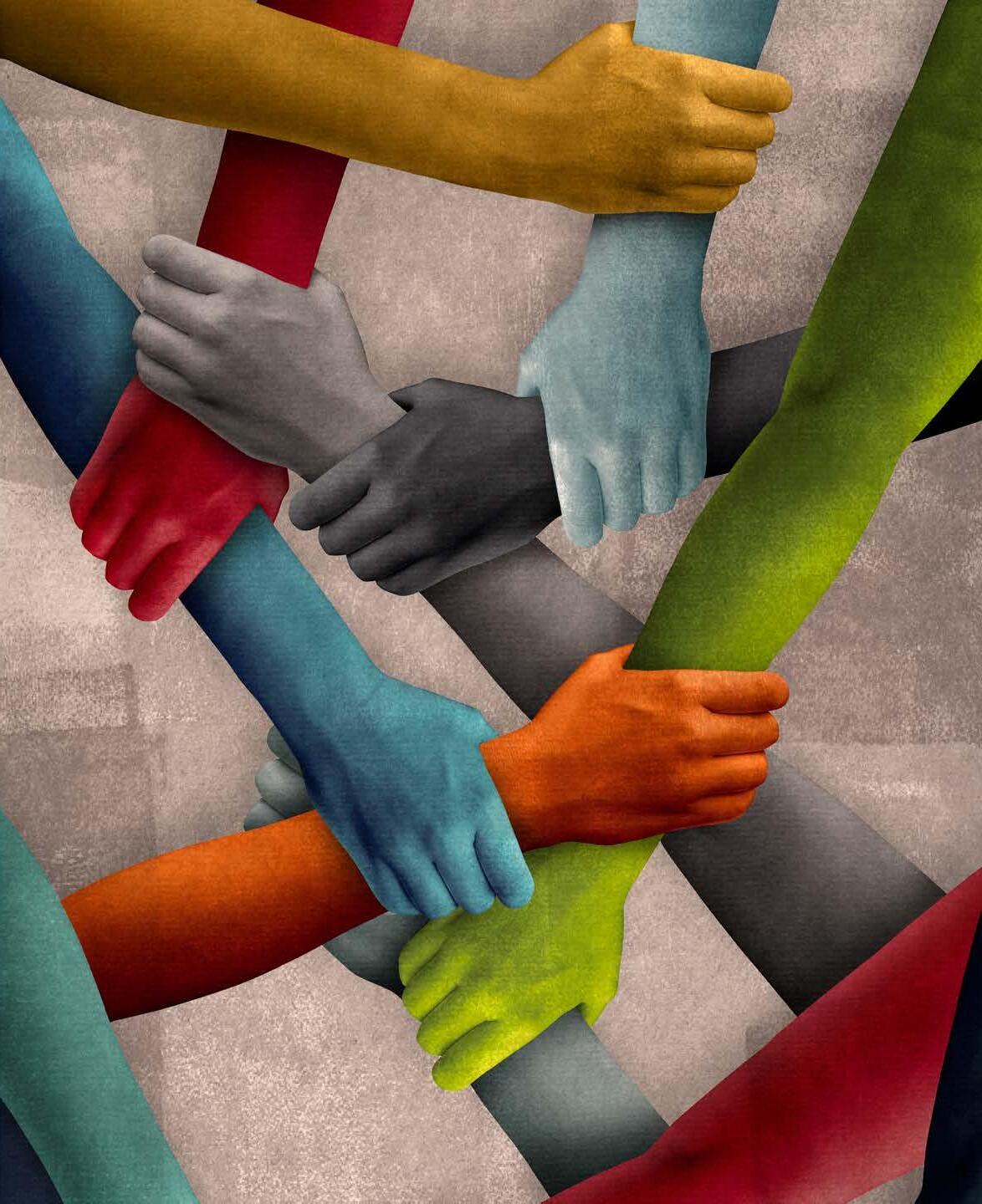
TEXT Mike Williams
Incorporating DEI policies into business events and workplaces creates a diverse and inclusive environment, fostering fresh perspectives, greater collaboration, and a richer exchange of ideas, leading to more impactful and dynamic events.
Venues and event organisers should ensure that materials and technology accommodate diverse needs, including physical accessibility, language support, and cultural considerations. And event organisers should consider making an early commitment to diverse speaker line-ups, panellists, and attendees by actively reaching out to underrepresented groups and creating equitable participation opportunities.
The business events industry increasingly prioritises Diversity, Equity, and Inclusion (DEI) initiatives, recognising their significant benefits for organisations and successful event outcomes. A strong
focus on DEI enhances the event experience, broadens audience reach and engagement, fosters innovation, creates new market opportunities, and improves employee satisfaction and retention – key priorities for the industry.
As businesses and event organisers acknowledge the importance of inclusivity, the industry is adopting strategies to ensure that events are welcoming, accessible, and equitable for all participants. Given the global nature of the business events industry and its diverse workforce, this shift is a logical progression.
Business events are critical global networking, knowledge-sharing, and economic growth platforms. However, past events have often lacked diversity in speakers, attendees, and accessibility measures. By prioritising DEI, the business events industry can cultivate a more inclusive environment that benefits all stakeholders,
“Creating physically and digitally accessible events is essential to ensuring equal participation”
attracts a broader range of participants, and enhances the overall event experience.
one of the most visible aspects of an event is its line-up of speakers and panellists. Event organisers can actively ensure representation across gender, age, race, ethnicity, and professional backgrounds, encouraging a richer exchange of global and regional perspectives. Traditionally, language barriers have limited speaker selection but advances in real-time translation technology now enable greater participation from non-Englishspeaking professionals, enhancing engagement in global meetings. Creating physically and digitally accessible events is essential to ensuring equal participation. Key initiatives include wheelchair-accessible venues and seating arrangements, sign language interpreters and closed captioning for virtual events, sensory-friendly spaces for neurodiverse attendees, and dietary options catering to religious and medical requirements.
With over seventy per cent of today’s workforce comprised of Gen Z and Millennials, event planners need to rethink how they design and execute events to align with the values, expectations, and engagement
preferences of these digitally savvy and socially conscious generations. Financial constraints should not be a barrier to event participation. Many organisations address this by offering tiered pricing structures or financial aid for attendees from disadvantaged backgrounds, providing hybrid or virtual attendance options to enhance accessibility, and partnering with local communities to ensure broader engagement.
An increasing focus on inclusive hiring practices and diverse supplier partnerships while maintaining merit-based standards can be achieved through sourcing vendors and suppliers from minority-owned businesses, providing opportunities for underrepresented event professionals and implementing diversity training for event staff.
To foster a respectful and welcoming environment, event organisers can introduce induction programmes for new employees, zero-tolerance harassment policies and precise reporting mechanisms, genderneutral restrooms, and platforms for employees to provide input on policies, plans, and operational issues. Such initiatives start from the organisation’s leadership.
offering flexible working hours or remote work options, where possible, accommodates employees with diverse needs, promoting a culture where everyone can thrive, regardless of their circumstances. A growing number of organisations are investing in DEI training programs. These initiatives help event professionals understand and address unconscious biases, implement inclusive eventplanning strategies, and earn DEI certifications to showcase their commitment to diversity.
As the business events industry continues to evolve, integrating DEI into every aspect of event planning will be essential. By embracing inclusivity, businesses and event organisers can create more meaningful, diverse, and impactful experiences for all attendees.

Aria Chen stood at a crossroads in the bustling metropolis of New York City. A virtuoso violinist, she had always been told that the orchestra was everything, that the collective harmony trumped individual brilliance. But deep down, a voice whispered that there was more to her story.
The Inner Conflict Aria’s fingers danced across the strings during rehearsals, her soul yearning to break free from the ensemble’s rigid structure. Her conductor, Mr Blackwell, noticed her restlessness. “Remember, Chen,” he’d say sternly, “there’s no ‘I’ in the orchestra.” But for Aria, there was an ‘I’ in violin, music, and passion.
The Turning Point Aria Chen decided on one fateful evening as the New
York Philharmonic prepared for their season opener. She deviated from the score during Tchaikovsky ’s Violin Concerto, infusing the piece with her improvisations. The audience gasped, then fell silent, enraptured by her daring performance. Mr Blackwell was livid. “You’ve ruined the piece!” he hissed backstage. “You’ve put yourself before the team.”
The Revelation But as Aria stood there, absorbing the criticism, she realised something profound. By expressing her true self, she elevated the entire performance. The standing ovation that followed was unlike anything the orchestra had ever received. “Sometimes,” Aria Chen said softly, meeting Mr Blackwell’s gaze, “by allowing individuals to shine, we create a brighter light for all.”
The New Harmony In the weeks that followed, a shift occurred. Mr Blackwell, initially resistant, began to see the value in allowing soloists more freedom. The orchestra’s performances became more dynamic and more alive. They weren’t just playing notes; they were telling stories.
Aria Chen had shown that expressing oneself didn’t have to come at the team’s expense. Instead, it could be what propelled the entire group to new heights. As she took centre stage for their next performance, Aria smiled. She had found her voice and, in doing so, had helped the orchestra find its soul.
Source: Unknown
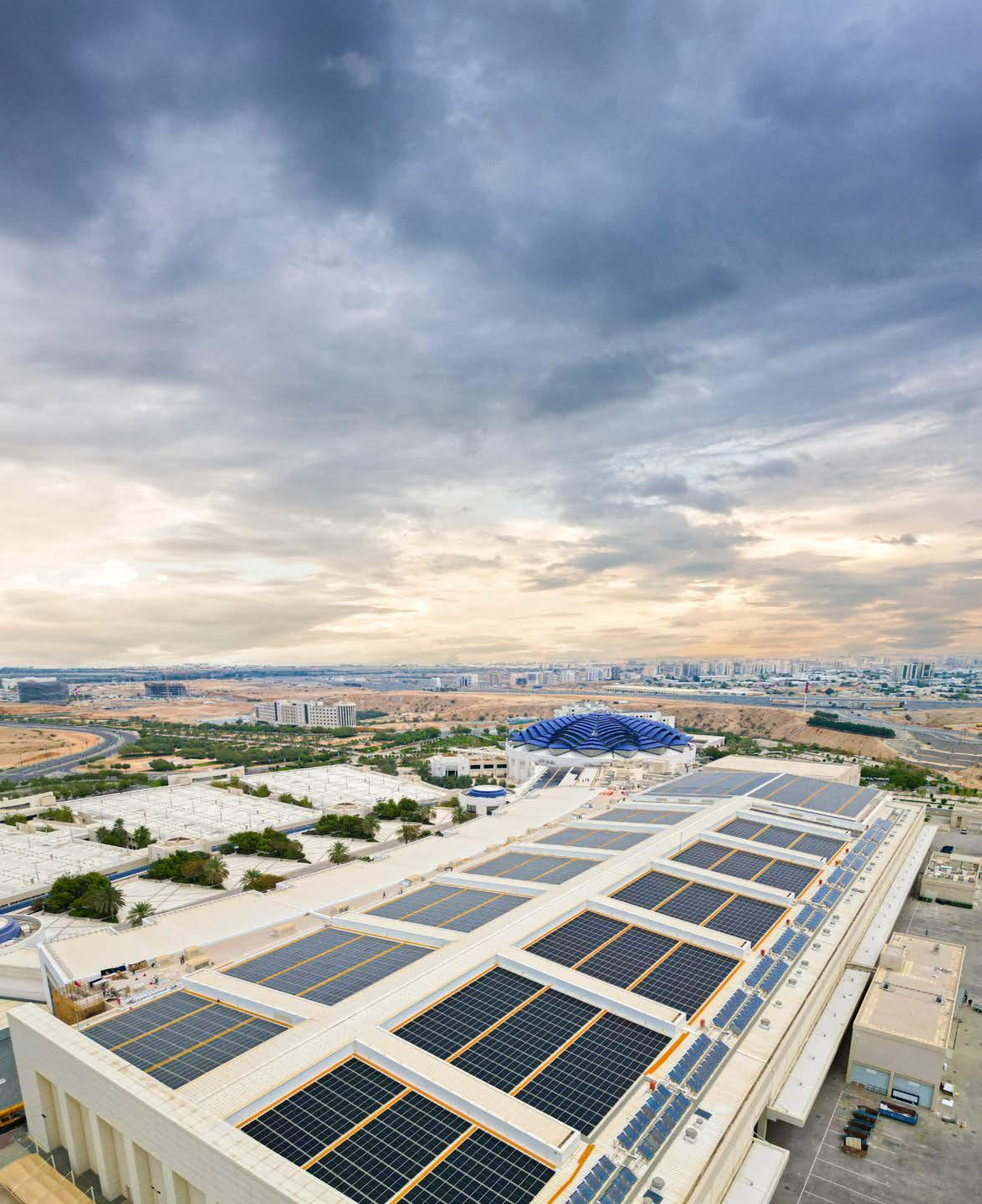
The Oman Convention & Exhibition Centre (OCEC) has firmly established itself as a premier destination for business events in the Middle East. Hosting large-scale energy conferences such as the GPCA 18th Annual Forum in 2024 and major exhibitions like Oman Sustainability Week, the venue has consistently demonstrated its versatility in orchestrating worldclass gatherings with international delegates. As oman takes significant steps toward sustainability, the sultanate is emerging as a destination committed to reducing its environmental impact.
Eng Said Al Shanfari, CEO of the oman Convention & Exhibition Centre, highlights this commitment: “oman has the goal of achieving netzero emissions by 2050. It is an ambitious target, but it is one that we have completely embraced at the OCEC to reduce our environmental impact.”
The sultanate has implemented concrete initiatives to lower its carbon footprint, earning global recognition. In a testament to these
efforts, oman was recently named the least polluted country in the GCC by the 2025 Pollution Index, a ranking issued by Numbeo, a global crowdsourced database.
At an industry level, Eng Said Al Shanfari and other industry leaders signed the UFI Net Zero Carbon Events pledge, recognising that the business events sector must play a greater role in combating climate change. However, he is clear that reducing carbon impact requires collaboration: “We know that reducing our carbon emissions is not something we can achieve alone as a venue; our partners, whether from the government or private sectors, also play an integral role.”
As oman continues its progress towards sustainability, the question arises: can the country position itself as a prime destination for sustainable events? According to the convention centre’s CEO, the answer is a resounding yes: “oman isn’t just a venue for conferences, it’s a destination with purpose. When you host your
event here, you’re not simply checking boxes; you’re becoming part of a broader conversation on sustainability in a country deeply committed to energy transformation. With local experts and insights, we offer more than one venue; we provide a platform for discussions on diversifying energy sources.”
For business event organisers seeking valuable insights and content, oman is emerging as a rising destination on the map. The venue offers organisers the chance to host their events in a space committed to sustainability, providing an impactful and environmentally conscious setting.
OCEC’s journey toward sustainability is only beginning, but the venue has already made significant progress. As of 2024 , 24 per cent of its total electricity is generated by 8 ,300 rooftop solar panels, making it one of oman’s largest rooftop solar projects. In collaboration with Total Energies Renewables and with the support of OMRAN Group, the
“The business events sector must play a greater role in combating climate change”
project aims to reduce CO2 emissions by 3 ,317 tCO2 e annually. Combined with its LEED Gold Certification and advancements in waste management, including partnerships with local suppliers to repurpose cardboard and plastic waste, the convention centre is actively minimising the environmental impact of its events.
“Achieving sustainable impact requires the right partners. oman’s circular economy and recycling sectors are growing, and further investment in this field will help reduce our carbon footprint.”
A key focus for OCEC is minimising exhibition waste, particularly disposable stands and food waste. In 2024 , the venue donated over 1 ,000 meals to the oman Food Bank and plans to expand this partnership while introducing on-site composting solutions.
For exhibitions, the centre draws inspiration from flagship events like Oman Sustainability Week, which promotes sustainable practices. This year, exhibitors will be encouraged to adopt the Better Stands initiative, ensuring stands and booths are reusable rather than disposable.
“one of our team members will serve on the jury for the Most Sustainable Stand Award 2025 . It will
enhance our expertise in recognising sustainable designs and guiding clients toward better solutions. Additionally, the events team has prioritised waste reduction, with 100 per cent of event carpets in 2024 either recycled or donated to charities.”
While the convention and exhibition centre is on its journey towards stronger sustainability credentials, oman offers compelling opportunities for organisers looking to host renewable energy or sustainabilityfocused events. Adding to this sector’s strength is the venue’s accessibility and welcoming atmosphere for international delegates. Whether oman can surpass other destinations in attracting renewable energy or sustainable events remains to be seen. Still, the country is on track to become a rising destination in this field.
According to Eng Said Al Shanfari, here are four key reasons to host a sustainable event in oman:
A Venue Built for Sustainability OCEC is designed with sustainability in mind, featuring energy-efficient infrastructure, solar power integration, and a commitment to reducing
its environmental footprint. Its prime location near the airport ensures ease of access for international delegates.
Oman’s Natural and Cultural Appeal From pristine beaches to vast deserts, the sultanate offers an inspiring setting that enhances any event. The country’s rich cultural heritage complements its sustainability efforts, creating a special and immersive experience for attendees.
A Nation Leading in Renewable Energy oman has invested significantly in green hydrogen and renewables. As a hub for global discussions on energy transition, it is a representative location for events focused on sustainability and innovation.
Oman is a growing force in Climate Action and actively addresses climate change through initiatives like Oman Climate Week, which draws international leaders and policymakers. Hosting events here aligns conferences with a country committed to environmental progress.

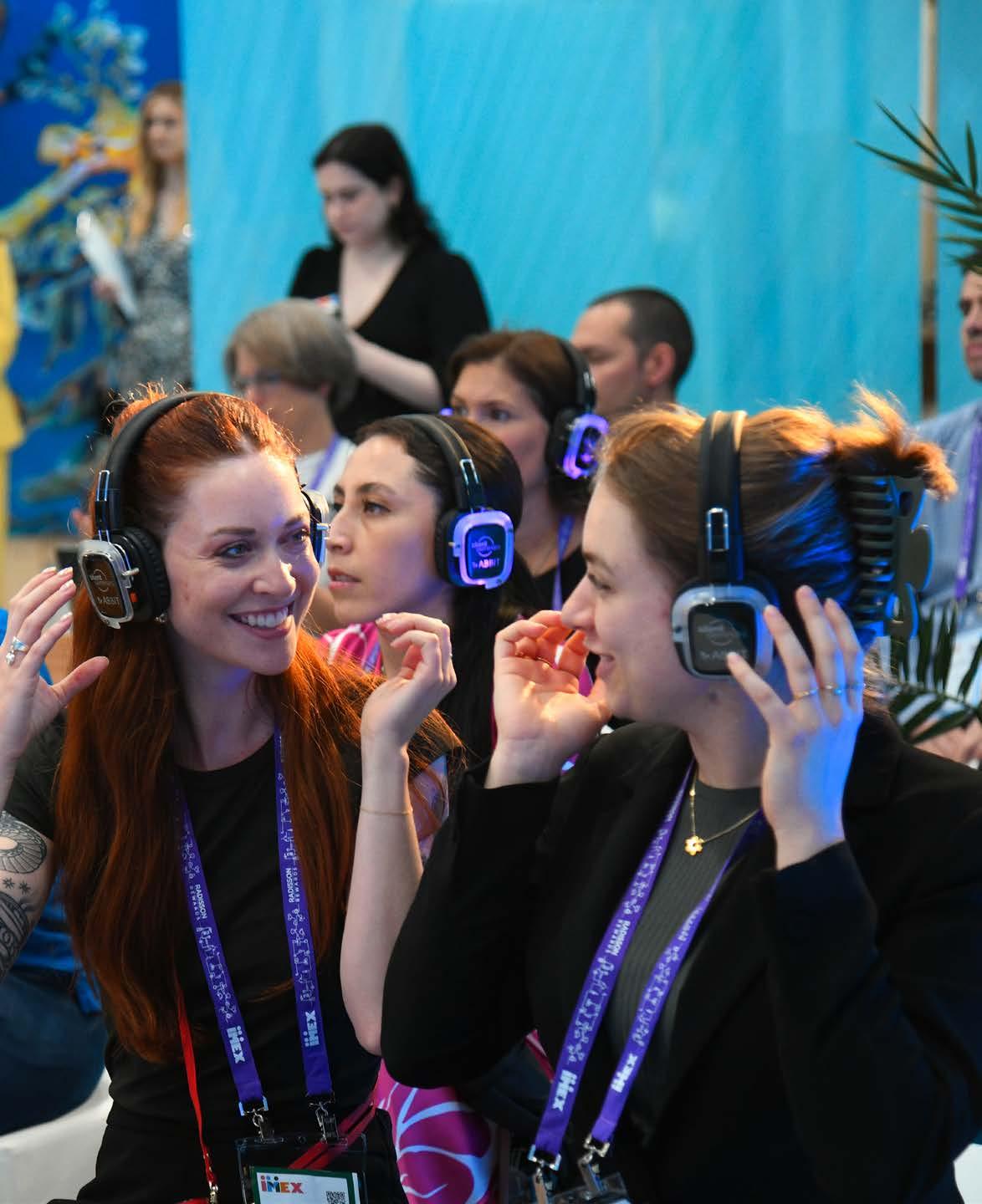
Imex Frankfurt has revealed the full rundown of education sessions ahead of the event, which will take place on May 20 –22 . The professional and personal development programme includes over 150 learning sessions, ranging from a full day of experience design learning to extreme leadership, risk management, tech, and wellbeing.
The education programme is free of charge and open to all, with the vast majority of sessions accredited by CMP, CSEP, and ICCA Skills. Moreover, Imex is partnering with Snapsight to instantly allow attendees to access key education takeaways from many sessions.
The 2025 programme is personcentred, recognising that attendees’ lives are no longer divided between home and work and that their challenges and desires for growth frequently overlap. Attendees can pick and mix across nine tracks to suit their requirements. Tangible, practical takeaways are front and centre, allowing them to sharpen their skills and apply what they’ve learned in their meetings the same day.
one of two new tracks, Design Matters, has been crafted to show how “good design is good business.” It is also the title of a panel session with Anna Gyseman, the Imex Head of Design, and Tobias Geisler, Cofounder of space experience design company Vave. Together, they’ll explore how to apply good design principles to all business areas, sharing practical examples from print, digital, retail, business events and festivals. Freelance creative director Robert Dunsmore moderates the panel, which ends with a private guided tour of Messe Frankfurt’s design archives, dating back to 1553 .
Another new track is the Experiential Event Design Pigalle Tavakkoli, Founder of the School of Experience Design, discuss Play to Innovate: Discover the Art and Science of Unlocking Creativity: “Experience Design allows us to go beyond simply designing the form and function of a product, event or service, also to design the attendees’ emotions, memories and behaviours, ultimately transforming their behaviour forever.”
The renowned College of Extraordinary Experiences is set to bring its special brand of imaginative innovation to the show for the first time. Attendees can meet with directors and alums from the College for conversation, hands-on creativity and challenges.
Event logistics is a practical track with experts casting a fresh eye and sharing the latest learnings on event planning fundamentals. Budgeting and negotiation, contract management, safety and risk management, and food & beverage trends will all be covered.
Impact is this year’s talking point at Imex. The sessions on Impact will delve into how to design gatherings that leave a lasting, positive impact on people and the planet.
Lego Serious Play: Using creativity for more sustainability will be led by Matthias Renner, Lego Serious Play facilitator at Brickolution: “My workshops show how a playful approach unites the analytical with the creative
“Sessions will focus on specific hot topics within the business world, including Navigating the impact of reduced attention spans ”
side of the brain to bring about real, impactful solutions for more sustainable event planning.”
other Impact sessions will explore, and open conversations about, Environmental, Social, and Governance (ESG), net-zero, and Diversity, Equity, and Inclusion (DEI).
In the Leadership and Culture session, a former combat helicopter pilot, a charity adventurer, and a global expedition leader are some of the speakers discussing their extreme leadership experiences. What these individuals have in common is that they’ve pushed boundaries and overcome barriers. This has given them insights into what it means to be a leader in difficult circumstances and how to lead others through tough times.
In the Marketing and Engagement session, communication expert Jose Ucar will talk about How to communicate with impact to build better human connections: “In the fast-paced world of business, complexity doesn’t impress. It confuses. Whether it’s a simple phrase that stays with you or a pitch that hits the mark, clarity and simplicity always win,”
other sessions will tackle sponsorship, stakeholder buy-in and data analysis.
In the Tech Innovation and AI session, futurist Henry Coutinho-Mason will look outside the business events sector and bring fresh insight into AI in the thriving AI era: “Non-obvious ways to design a people-first AI strategy.”
According to Henry CoutinhoMason, one of the keys to innovation is duplication: “one secret I learned in my decade running a global consumer trend agency is that the best innovators are thieves. They look to adjacent industries, spot emerging customer expectations, then use these to create compelling new experiences for their audiences.”
Industry leaders Maritz, DRPG, Spark, and Snapsight will use their on-the-ground experience with clients and stakeholders worldwide to show planners how best to use technology to improve efficiency and success.
Trends and Research The latest research from major industry players, including AMEX, Cvent, Events Industry Council (EIC), Hilton, SITE,
and Skift, will uncover significant market shifts. other sessions will focus on specific hot topics within the business world, including Navigating the impact of reduced attention spans on business events, The Good, Better, Best guide to ROI measurement, and Exploring what makes good brand communication
The Wellbeing Lounge offers a programme of meditation breaks, breathwork, and qigong workshops, all designed to help attendees recharge between meetings.
With the World Health organisation calling loneliness a pressing health threat, planners have an opportunity to redesign events to prioritise wellbeing and connection. Knowing this, the Imex team has returned to its “Tough Talks” following their launch last year. These are safe spaces for honest and sometimes difficult discussions on topics such as men’s mental health, grief, women’s health issues, and workplace relations.
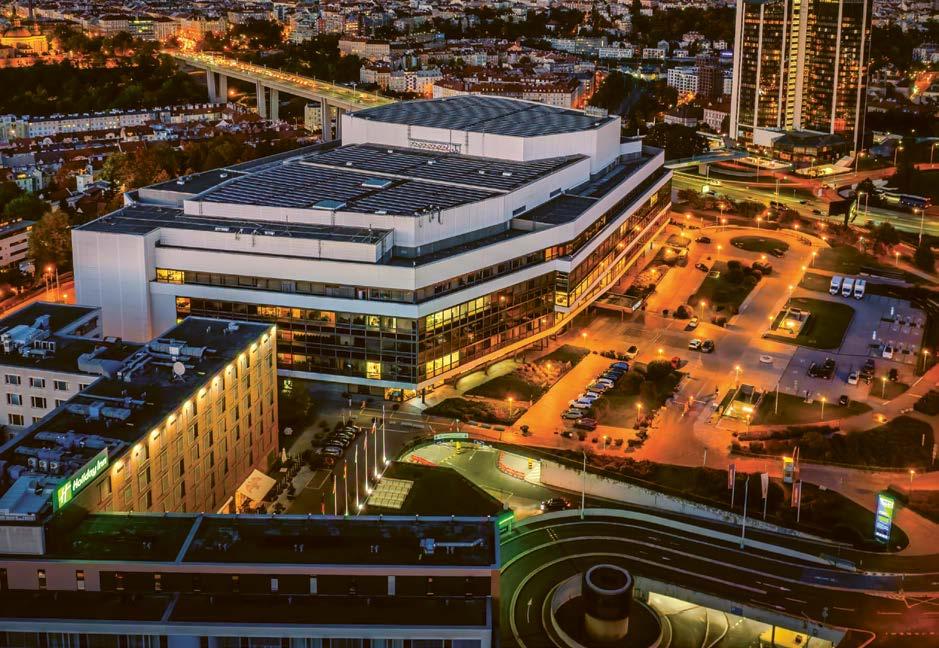
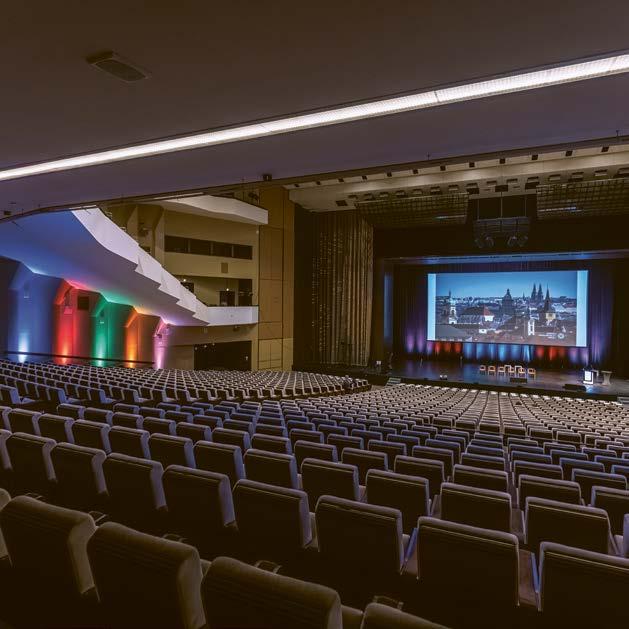
How about hosting an international congress in a living-art gallery with a direct view of Prague at your fingertips? Or perhaps a business meeting in an iconic interior design setting? Imagine a conference that is not only professionally enriching but also purely sustainable. The Prague Congress Centre offers it all.
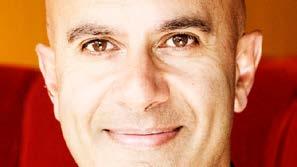
PHOTO Sara Appelgren
In a survey of 22 ,000 business people ranking top leadership gurus, Robin Sharma was #2 , with Jack Welch. Sharma’s books have sold millions of copies in over 60 countries. His new book is “The Leader Who Had No Title: A Modern Fable on Real Success in Business and in Life” (Simon & Schuster). Robin Sharma founded the Titan Academy and his blog is at robinsharma.com.
As I walked the streets of London this morning, I thought about the essentialness of forgiveness. First, Confucius had it right when he advised, “Before you go off to seek revenge, it’s best to dig two graves.” Getting brilliant at forgiving those who have wronged and hurt you delivers these benefits to you as a leader, producer and person:
You avoid becoming a resentment collector, full of negativity and cynicism.
You protect the energy needed to get big things done.
You live in the present and pursue a more prosperous future rather than staying stuck in the past.
You free up a ton of creativity that would be consumed grumbling about what someone did to you.
You remain peaceful and helpful instead of obsessing about being mistreated.
A few of the forgiveness rules that have been super useful to the clients I mentor:
1
Forgiveness isn’t condoning the behaviour No. It’s more about understanding that everyone does the best they can based on how they think. And, as the author Maya Angelou observed: “If they
knew better, they would have done better.” How they behaved made sense to them then (read that twice), even if their actions were foolish and hurtful. So, practice the master skill of letting go.
2
Let success be your confident reply Staying bitter and stagnant is a violent defeat. I suggest you try to use what someone did to you as soil for your growth and fuel for your winning. Let any pain you suffer actually purify you by processing through it so that you become emotionally richer, internally stronger and personally wiser. And, as best as you can, exploit this newfound clarity, creativity and maturity to build glorious fortunes of success, beauty and inner freedom. Let an even more beautiful life be your elegant response.
3
What’s yours can’t be taken from you Mum taught me this one, and I wrote about the lesson in-depth in my latest book, The Wealth Money Can’t Buy. She taught me that what’s meant for me can’t be taken from me, and if something didn’t work out the way I wished it would have, it just wasn’t meant to be. Allow people to be on their path and know that what unfolds for them is
none of your business. Do your best and trust, with deep faith, that life has your back. And that what appears is always for your fortune, never for your failure.
4
Keep Death Close (KDC) Reflecting on how short life really is – and the fact that in 100 years, everyone alive today will be dust – will give you perspective. A mistreatment that seems so big will begin to look small. You’ll see the value of moving on and letting the hurter deal with their karma. And you’ll be energised to “stick to your knitting” by doing what you know to be right, making excellent daily progress and remembering that good things inevitably happen to people who do great things.

Book your meeting or event with Radisson Meetings and enjoy up to 3 additional benefits.
Choose 1, 2, or 3 complimentary extras, depending on the value of your event.
This offer is available for meetings and events booked by 31 December 2025 and held before 31 March 2026, at participating hotels across Europe, the Middle East, Africa, and Asia Pacific.
€1K plus – Pick 1
• Upgraded tea and coffee break
• 10,000 Radisson Rewards Points
• Complimentary car parking for the Meeting Organizer (one space), upon availability
€5K plus – Pick 2
• Upgraded tea and coffee break
• Accommodation upgrade (3 rooms)
• Breakfast break
• 20,000 Radisson Rewards Points
• Complimentary car parking (5 spaces), upon availability
• Additional 2% cancellation attrition within 14 days of arrival
€20K plus – Pick 3
• Upgraded tea and coffee break
• 50,000 Radisson Rewards Points
• Accommodation upgrade (5 rooms)
• Breakfast break
• Complimentary car parking (5 spaces), upon availability
• Complimentary candy / Healthy Snack (1 serving)
• Additional 2% cancellation attrition within 14 days of arrival
• Locally inspired surprise benefit
€40K plus – Pick 4
• Upgraded tea and coffee break
• Accommodation upgrade (7 rooms)
• 1 Break-out room or Organisers Office
• 100,000 Radisson Rewards Points
• Complimentary car parking (5 spaces), upon availability
• Complimentary drinks reception
• Additional 2% cancellation attrition within 14 days of arrival
• Locally inspired surprise benefit
• Site inspection: accommodation for up to 2 rooms complimentary


€65K plus – Pick 5
• Upgraded tea and coffee break
• Accommodation upgrade (10 rooms)
• 1 Break-out room or Organisers Office
• 150,000 Radisson Rewards Points
• Complimentary car parking (5 spaces), upon availability
• Complimentary drinks reception
• Additional 2% cancellation attrition within 14 days of arrival
• Locally inspired surprise benefit
• Site inspection: accommodation for up to 2 rooms complimentary
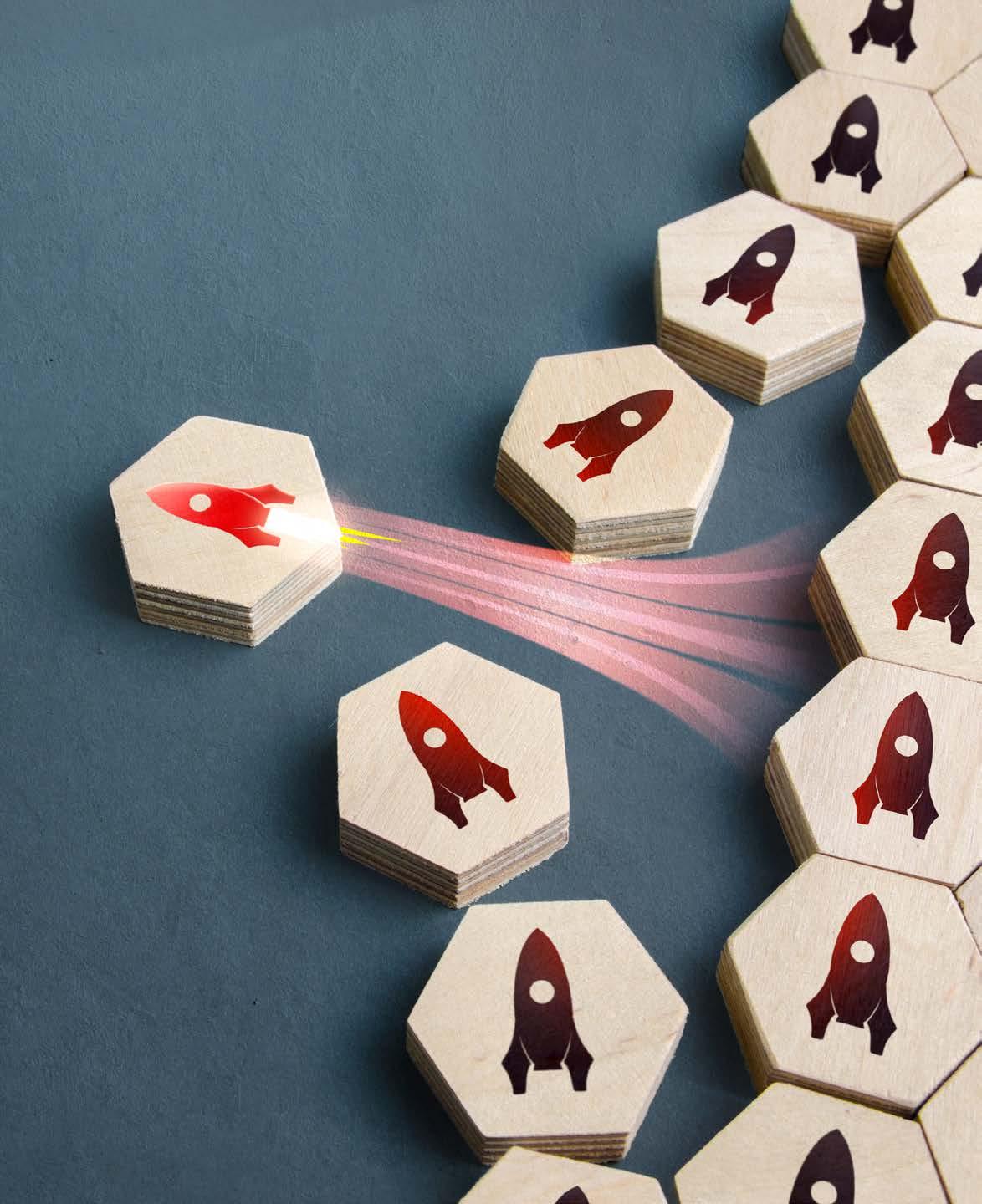
TEXT Scott Steinberg
Let’s be honest: As full of new and emerging companies, trends, and technologies as the business events industry has become, meeting and event planners now face increasing pressure to stand out in a crowded market. And in a world where countless competitors are just a click or call away, there’s only one cardinal sin when it comes to marketing: Being nondescript and/or boring. As we explain in the new book, Steinberg’s Guide to Creating Competitive Advantage, differentiation is essential. Essentially, in an age of infinite choice, you’re either seen as a musthave, luxury pick or a nondescript, easily-replaced commodity, with
no room or budget for an undistinguished or commonplace offering in the middle.
Thankfully, finding ways to stand out in a hypercompetitive field doesn’t have to be as expensive, time-consuming or challenging as you might think. Having worked with hundreds of meeting and event planners to build attention-getting keynote speaker sessions and standout conference programming, take note. There are many clever and cost-effective strategies that you can employ to help differentiate your conference or convention, deliver heightened value for attendees, and stay one step ahead of the pack.
Embrace Technology and Digital Innovation one of the most effective ways for business events industry leaders to gain a competitive edge is by leveraging cutting-edge technology. For example:
Leveraging augmented reality (AR), virtual reality (VR), online, Metaverse and hybrid event technologies to explore new digital
AI, Automation and Industry 5 .0 Technologies.
Ways to Connect with New Clients Virtually and online.
Cutting-Edge Advances in Banking, Credit and Fintech.
New Frontiers in Cybersecurity or Medical Advances.
Planners can position themselves as the go-to experts in their chosen
“ There’s only one cardinal sin when it comes to marketing: Being nondescript and/or boring”
frontiers in connectivity, expand events’ reach, and offer more flexible solutions to clients.
Utilising comprehensive software solutions for registration, scheduling, and heightened attendee engagement (or crowdsourcing content ideas and session suggestions) to streamline operations and enhance the overall event experience.
Implementing data-driven decision-making and AI-powered tools to optimise event performance, hyper-personalise experiences, and create content programming that delivers clients more Return on Investment (ROI).
Specialise in Niche Markets While being a generalist has its merits, specialising in specific industries or event types, especially those in emerging avenues of research or interest, can set planners apart from the competition. By way of illustration, you might offer programs on:
niche, commanding higher fees and attracting clients seeking specialised knowledge.
Focus on Sustainability and Social Responsibility As environmental concerns and social issues gain prominence, meeting and event planners might also differentiate themselves by:
Implementing sustainable practices that reduce waste, use sustainable materials, and involve partnering with environmentally conscious vendors.
Integrating social impact initiatives, charitable components or community service into events.
Instituting programming activities that allow participants to give back to their community or promote eco-friendly practices while collaborating and networking.
Enhance Creativity and Experience Design At a time when attendees crave special and memorable
experiences, planners can also gain a competitive advantage by:
Developing innovative event concepts and creating immersive, experiential events beyond traditional formats.
Weaving storytelling elements and compelling narratives throughout the event to engage and inspire attendees.
Emphasising sensory experiences and designing events that appeal to multiple senses, creating lasting impressions.
Cultivate Strong Industry Partnerships Building a network of reliable partners and suppliers that provide access to extraordinary deliverables also offers opportunities to create a significant edge. For instance:
Developing relationships that provide access to exclusive venues and outstanding experiences unavailable to competitors.
Partnering and collaborating with complementary service providers and businesses in/out of your field to offer original solutions.
Working with custom package providers to design tailored activities, dining offerings, and one-ofa-kind meeting formats.
Leverage Data and Analytics for Continuous Improvement Data-driven decision-making can give planners a significant advantage, enabling them to:
Collect and analyse event data, then use metrics to plot better, more targeted content programming and identify emerging areas of interest to focus on.
Implement feedback systems that let you gather and act on attendee and client feedback to refine future events.
Benchmark performance, then compare results against industry






This is The CCD, an iconic building in the centre of Dublin, the home of one hundred thousand welcomes. When you choose The CCD for your event, you’re not just getting a venue. You will be warmly welcomed to a stunning and light-filled building in the heart of Dublin, a city steeped in history, culture and beauty. You will experience the best of Irish hospitality, with sustainable and locally sourced produce. When you bring your event to The CCD, your event is our event. Our team of experts will partner with you to deliver your event seamlessly and beyond your expectations.
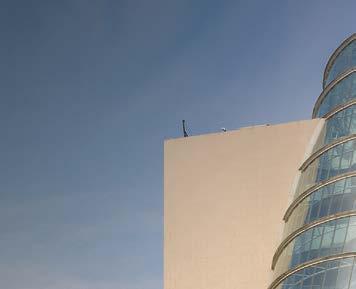
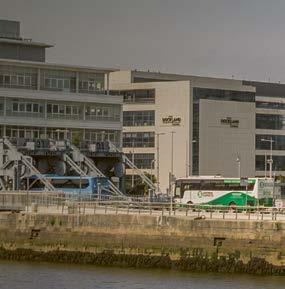












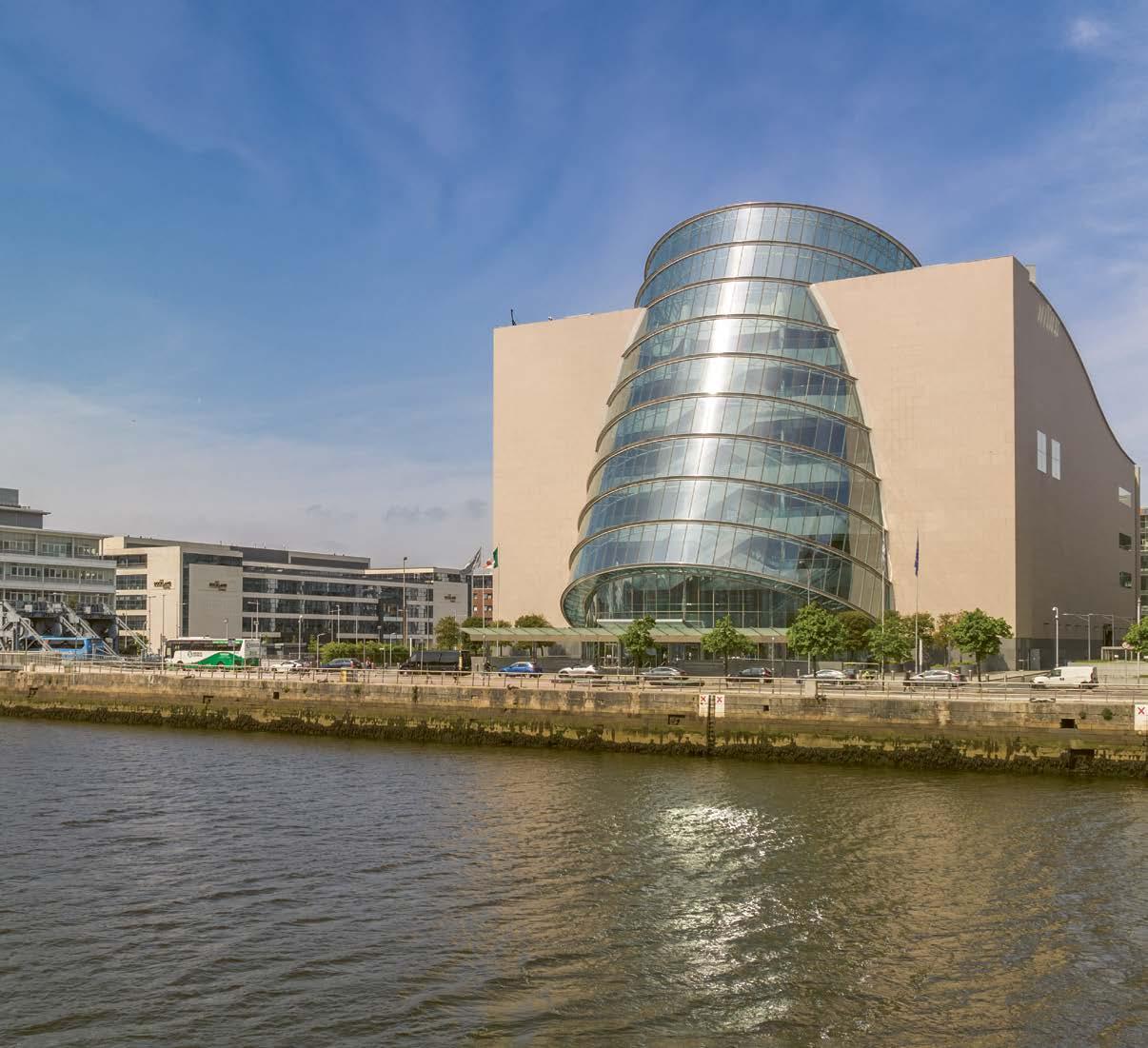





“Planners must be proactive, innovative, and committed to continuous improvement”
standards and best practices to drive continuous improvement.
Harness the Power of Influencer Partnerships Collaborating with industry influencers can significantly boost a program’s visibility and credibility. Strategies include:
Cocreating content and partnering with influencers to produce valuable insights for the industry.
Designing influencer-led experiences and incorporating wellknown personalities into event programs to increase appeal.
Cross-promoting and leveraging influencers’ networks to expand reach and attract new clients.
Embrace Gamification and Interactive Technologies Incorporating game-like elements and interactive technologies can significantly enhance engagement. Planners can:
Develop custom event applications that facilitate networking, agenda planning, and more interactive sessions.
Implement extended reality (XR) or spatial computing experiences
to provide immersive product demonstrations or venue tours.
Design competition-based activities, such as creating challenges or contests that promote interaction and learning.
The business events industry is more crowded and competitive than ever. It’s also profoundly impacted by new technological advancements and changing attendee expectations. To stand out, excel in the field, and build and maintain a competitive advantage, planners must be proactive, innovative, and committed to continuous improvement. Thankfully, with a few simple shifts in strategy and thinking, business event industry pros can differentiate themselves in a crowded market, deliver superior value to attendees, and position themselves for long-term success. Planners can position themselves as indispensable partners in creating meaningful and impactful events by combining creativity, technical expertise, and a deep understanding of human dynamics.
Hailed as the World’s Leading Business Strategist, award-winning strategic consultant and professional speaker Scott Steinberg is among today’s best-known trends experts and futurists, and the bestselling author of ‘Steinberg’s Guide to Creating Competitive Advantage,’ ‘Think Like a Futurist: The Next Normal,’ ‘Make Change Work for You,’ and ‘Fast >> Forward: How to TurboCharge Business, Sales, and Career Growth.’
The creator of ‘What’s the Future of …?’, a new series of training games for play at meetings and events, and the President and CEO of BIZDEV: The International Association for Business Development and Strategic Partnerships, his website is: www.FuturistsSpeakers.com.

Roger Kellerman Publisher, business intelligence analyst, trend creator, educator and networker. Has over 40 years’ experience of the global meeting industry. Founder of Mötesindustriveckan. twitter.com/thekellerman
The academic world in the United States is facing significant challenges under the current US Administration, with substantial financial losses and broader impacts on research, education, and academic freedom. How many Nobel Prizes will the US forgo as a result? And how many scientific conventions will it lose out on?
The Administration proposed slashing overhead costs for research grants to a flat 15 per cent, down from rates as high as 78 per cent at some institutions. This change threatened billions of dollars in university funding, impacting essential infrastructure and research operations. over €889 million in federal grants have already been cancelled or frozen for institutions like Princeton, Cornell, and Columbia due to political pressures or insufficient compliance with administrative demands.
Johns Hopkins University laid off over 2 ,000 employees after losing over €711 million in funding. The National Institutes of Health has terminated nearly 800 research projects, totalling over €2 billion in funding cuts. This has disrupted critical studies in areas such as cancer, Alzheimer’s, transgender health, vaccine hesitancy, and STEM research. Agencies like the Environmental Protection Agency, National oceanic and Atmospheric Administration,
and National Science Foundation face budget cuts of up to 50 per cent. These reductions hinder climate research, environmental protection, and energy innovation.
US scientists have been barred from participating in international collaborations, such as climate change meetings. This limits global scientific cooperation and diminishes US influence in major scientific conventions. Pseudoscientific theories, such as the antivaccine rhetoric promoted by Robert Kennedy Jr, the head of the Department of Health, are increasingly shaping public health policies. This undermines evidencebased research and contributes to public health crises. overall, these actions risk dismantling America’s scientific leadership and ability to effectively host or participate in international conventions.
Many universities have reduced or halted PhD admissions due to funding uncertainties, leaving prospective graduate students without opportunities to pursue advanced education. Cuts to programs like the National Institutes of Health have frozen essential biomedical research funding, potentially derailing discoveries for decades.
The Administration dismantled diversity, equity, and inclusion (DEI) initiatives across academic
institutions. Strict immigration policies and reduced funding have led to a “brain drain,” with American researchers increasingly seeking opportunities abroad. Universities worldwide are capitalising on this shift by attracting US-based academics. The United States’ reputation as a global leader in higher education is waning as prospective students and researchers reconsider its appeal due to financial instability and ideological pressures. Policies targeting elite universities have been described as an unprecedented assault on academic freedom and autonomy. Experts warn that these policies could lead to a “lost generation” of scientists, which would have long-term consequences for America’s technological and economic leadership.
In summary, the Administration’s policies have inflicted substantial financial losses on US academia, amounting to billions of dollars, and disrupted research, education, and intellectual freedom while driving talent overseas and eroding the nation’s global academic standing. This will lead to the loss of scientific conventions and the loss of future Nobel Prize awards.
Is the rest of the world ready to take over, or will we see the same developments in other parts of the world as well?
We’ll do the same
In Amsterdam, a movement is brewing towards a more sustainable, plant-based future led by innovative thinkers like Marcel van der Heijden, co-founder of Plant FWD. As Marcel explains, “An enormous pool of innovative, creative talent exists here. When you’re surrounded by companies playing at the Champions League level, it’s instinctive to rise to the occasion. The inventive ecosystem makes us aim much higher.”
Find out more about meeting in the Netherlands via holland.com/meetings
The Plant FWD concept was born from a conversation between Marcel and co-founders, Maartje Nelissen and Tom van Duijn on a terrace. They discussed the impact of food waste and the potential of plant-based diets. This led to the creation of a completely new platform aimed at accelerating the shift towards plant-based proteins. “This doesn’t mean eating 100% plant-based food. Our goal is for plantbased to become a larger part of the overall diet.” The founders consciously chose to launch with an event as a way to connect like-minded people in the plant-based protein space. “Our
first event brought together over 750 changemakers from retailers, brands, start-ups and policy makers at Theatre Amsterdam, one of the city’s newest and most sustainable venues.”
Accelerating change with every bite
Plant FWD is a platform to help companies work together and accelerate the protein shift. As Marcel explains “Currently people eat roughly 40% plant-based and 60% animal proteins. This won’t change overnight to 100% plant-based. The transition is step-bystep with a goal to get plant-based protein consumption closer to 60% by 2030.”
Plant FWD’s vision is fuelled by a belief in the power of collective action and Marcel emphasizes this direction as a connector, “By collaborating with major municipalities like Amsterdam, it helps drive the transition forward internationally.” Countries like Israel, Canada, Denmark, and the US are actively engaged. “We see Amsterdam as the bridge to ensure the city remains at the forefront of sustainable progress.”

